page. 32. they/themHere to write a blog nobody will read.
Don't wanna be here? Send us removal request.
Text
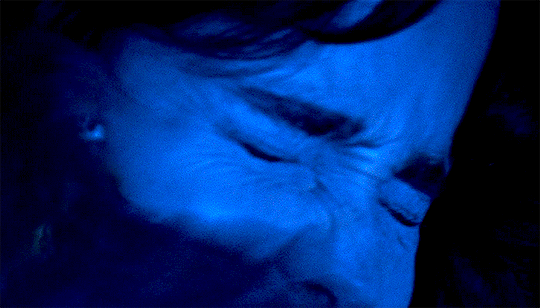
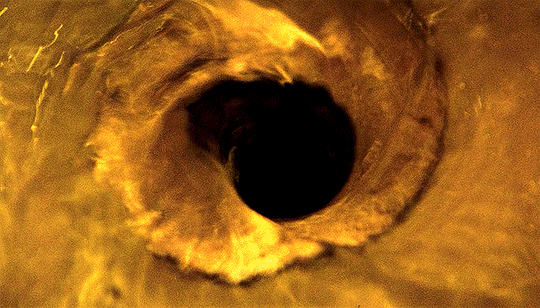

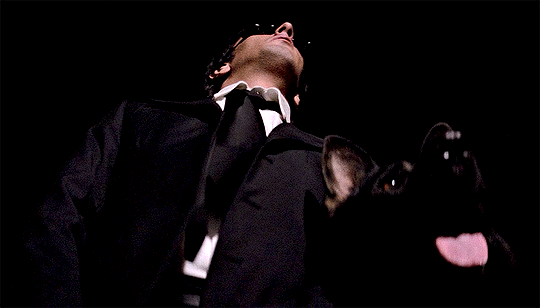
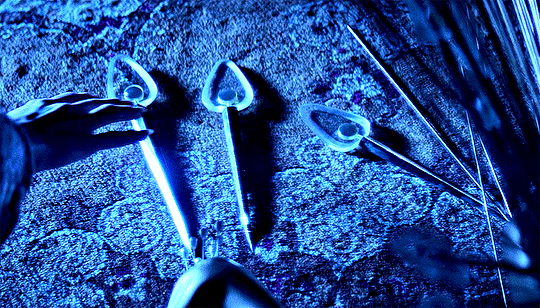
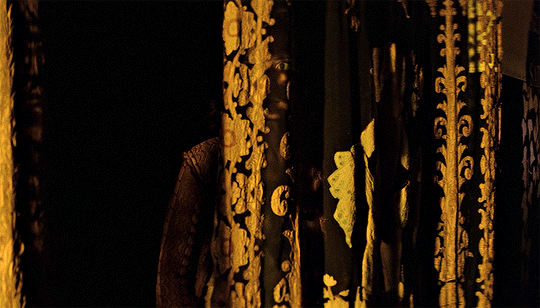

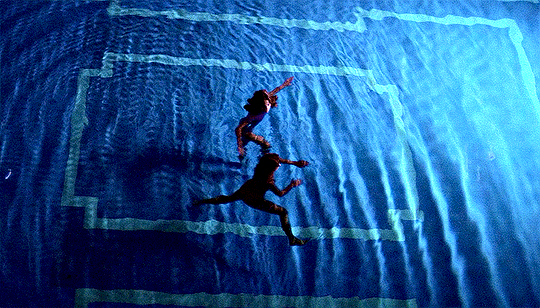
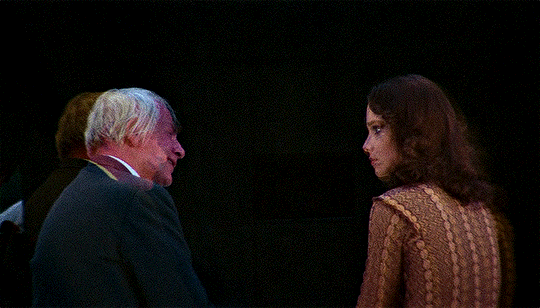
A MOVIE A DAY KEEPS THE GHOULIES AWAY - DAY 6 ↪ Why do you have all this interest in the occult? SUSPIRIA (1977) dir. Dario Argento
1K notes
·
View notes
Photo

Marilyn Monroe photographed on the set of ‘River of No Return’ (1954).
1K notes
·
View notes
Photo

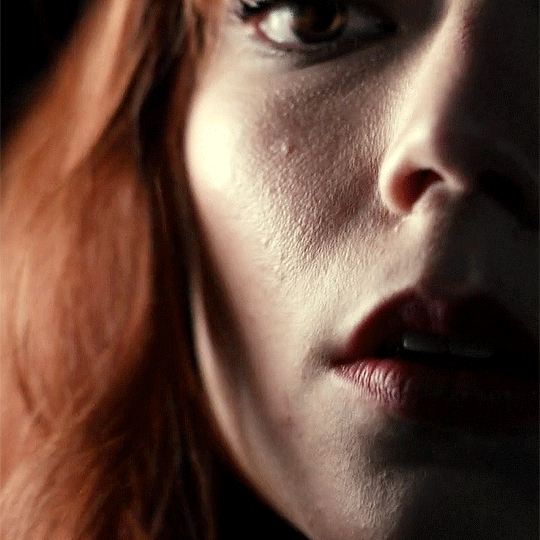




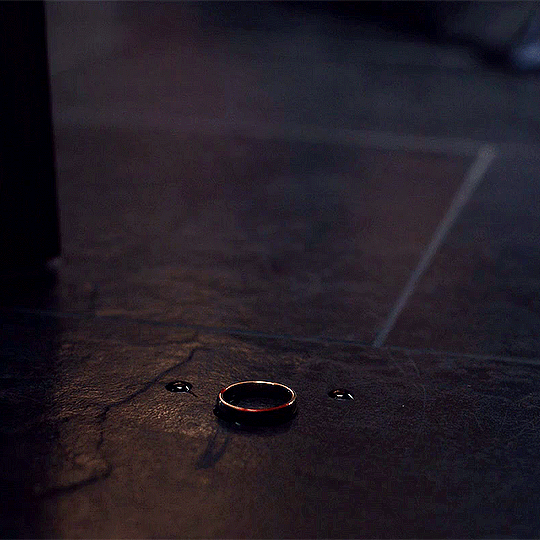


2/31 DAYS OF HALLOWEEN — The Menu (2022)
1K notes
·
View notes
Text



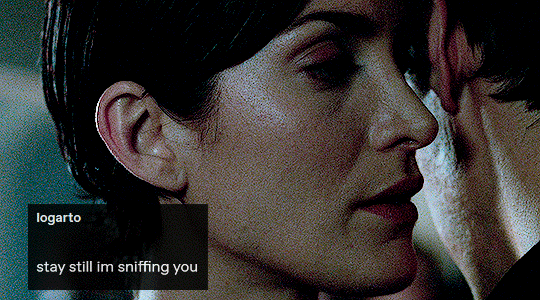
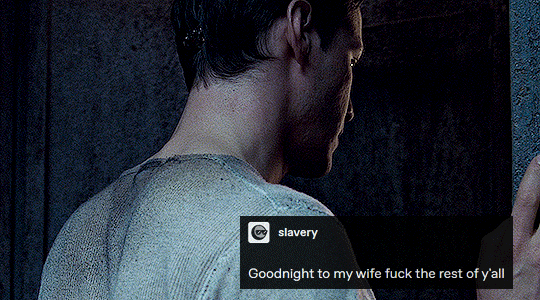
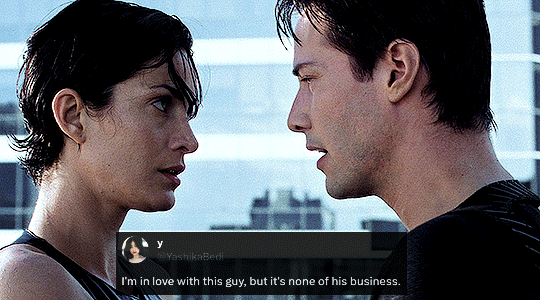
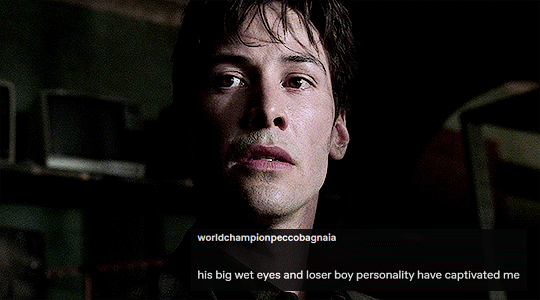
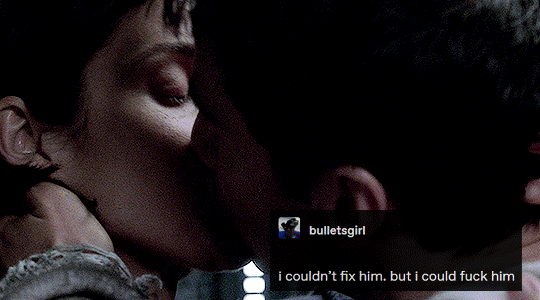
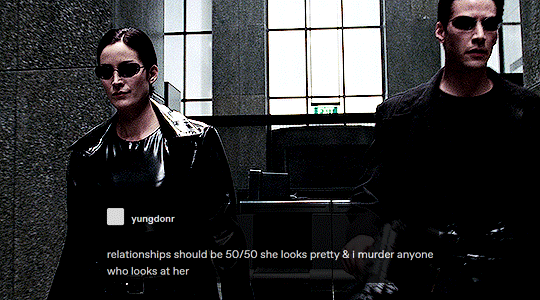

NEOTRIN + text posts and tweets
2K notes
·
View notes
Text

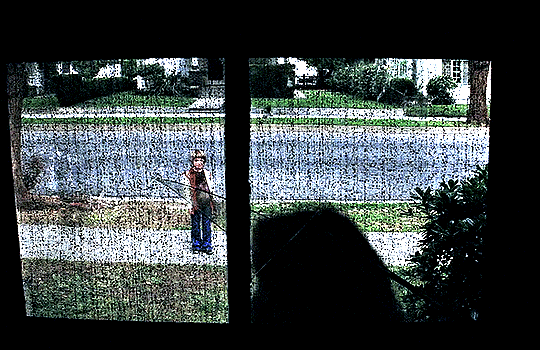






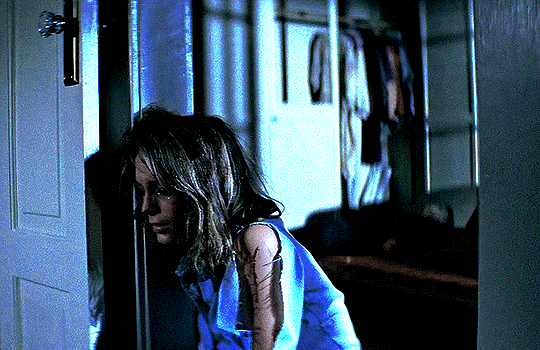
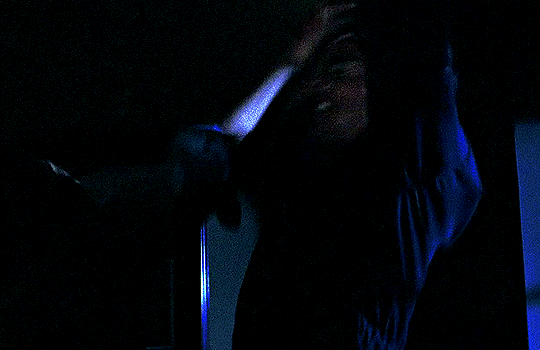
It's Halloween. Everyone's entitled to one good scare. HALLOWEEN (1978), dir. by John Carpenter
447 notes
·
View notes
Text

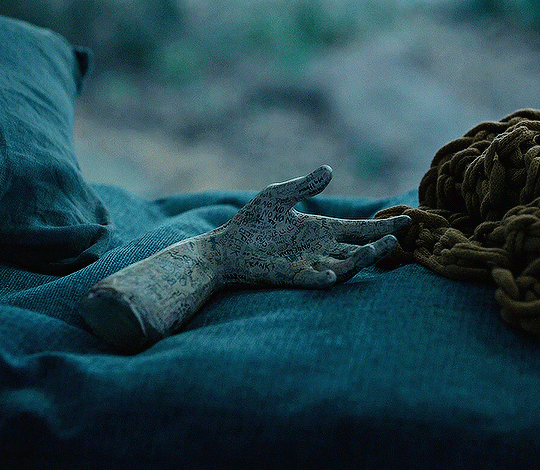

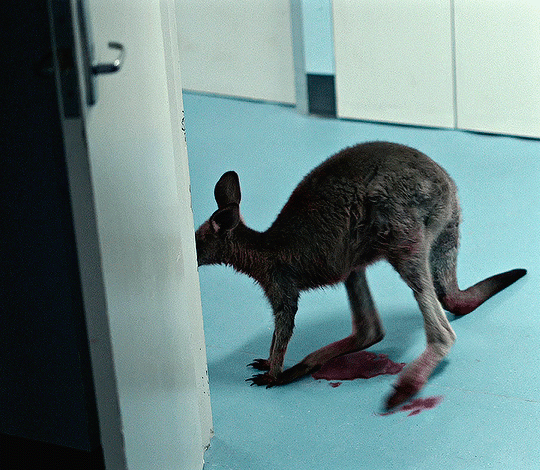
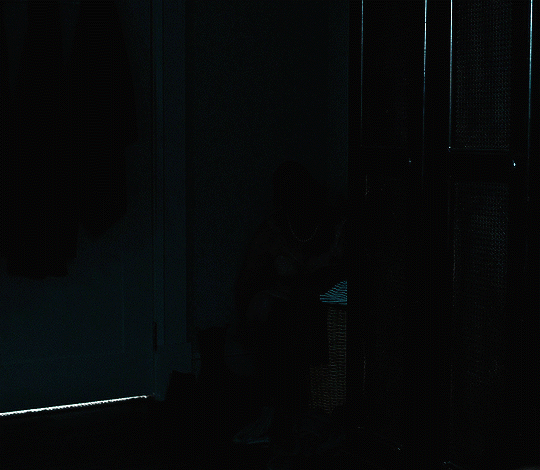

TALK TO ME (2022) dir. Danny Philippou and Michael Philippou

938 notes
·
View notes
Text

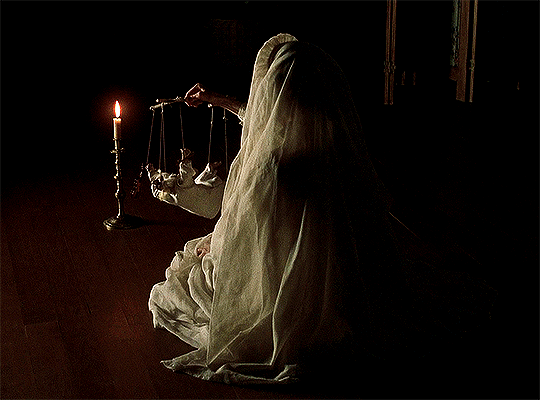



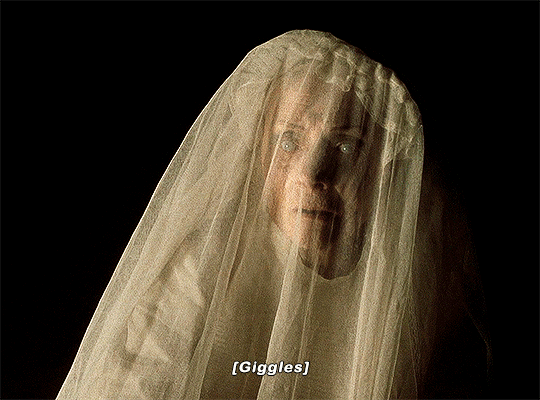
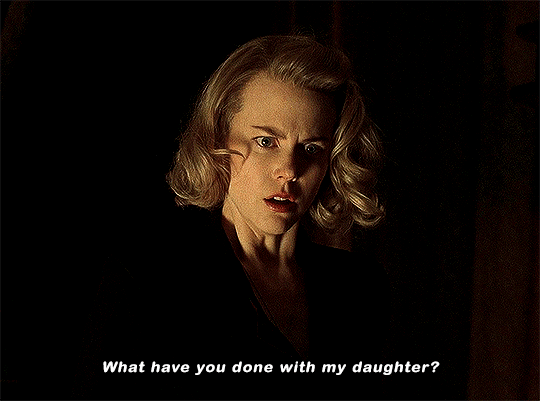

THE OTHERS 2001 | dir. Alejandro Amenábar
2K notes
·
View notes
Text
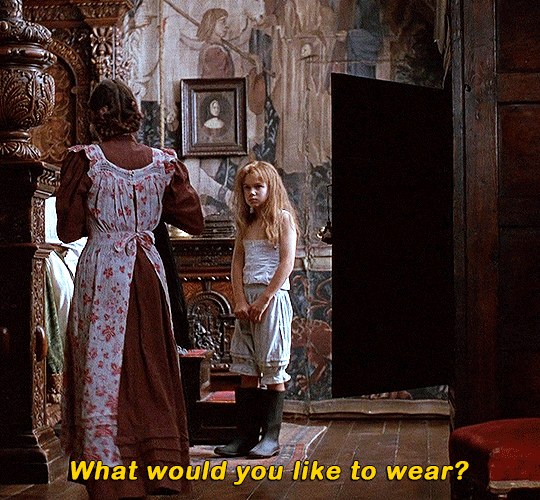
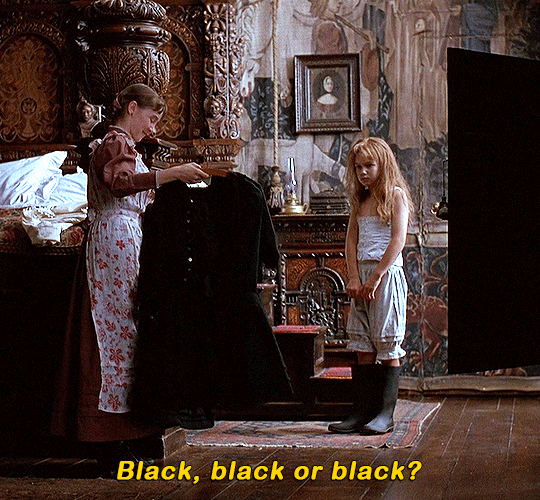
#my mind whenever i need to get dressed for any occasion The Secret Garden (1993) dir. Agnieszka Holland
3K notes
·
View notes
Text

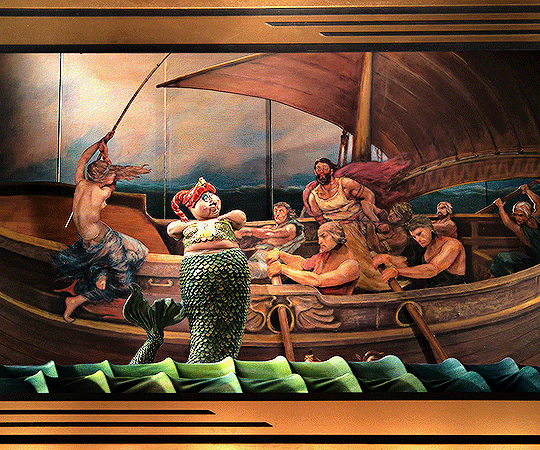
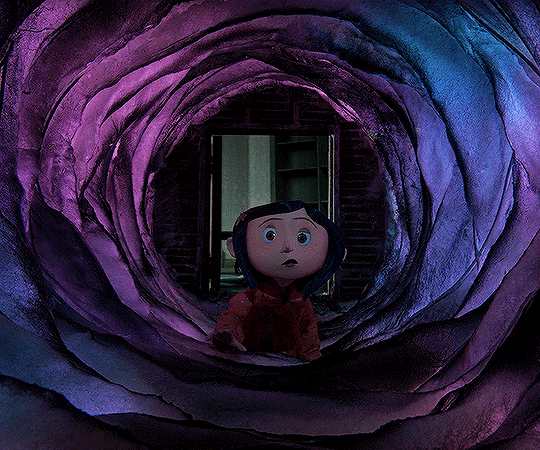




You probably think this world is a dream come true. But you're wrong.
CORALINE (2009) dir. Henry Selick
4K notes
·
View notes
Text
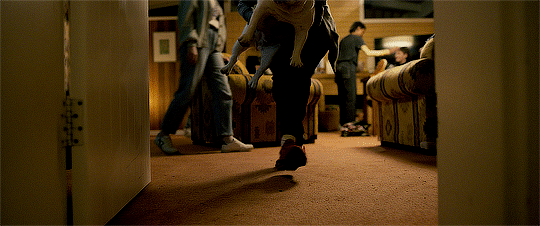
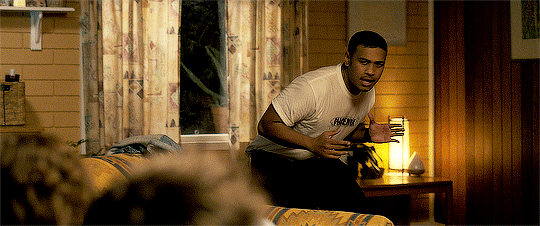
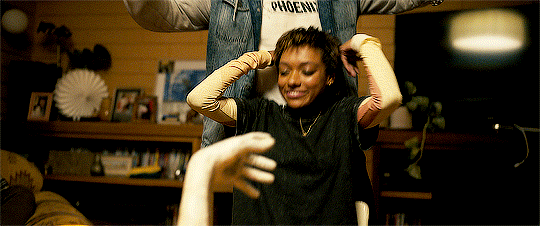
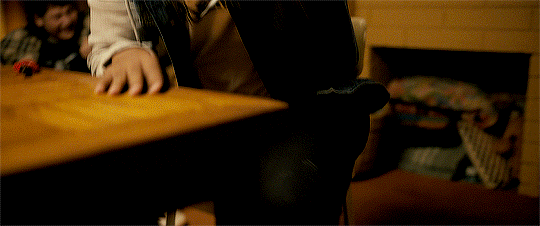
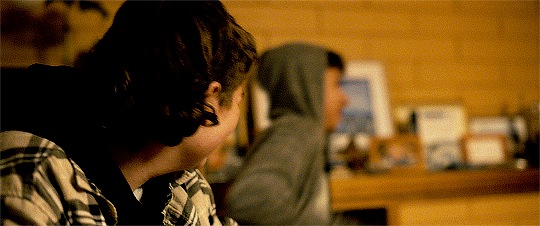
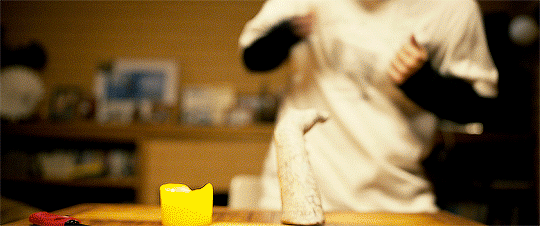
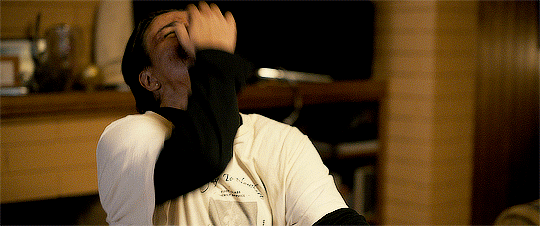




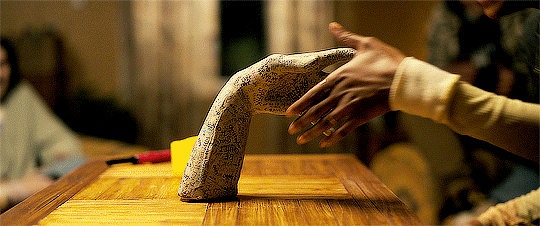
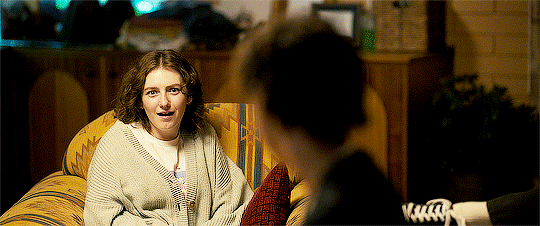
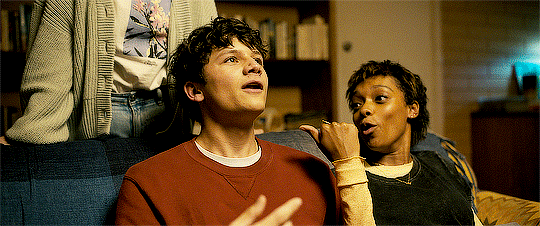

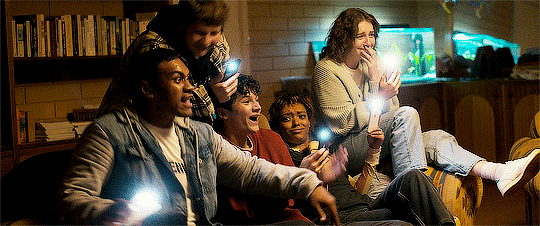
Talk to Me (2022) dir. Danny Philippou and Michael Philippou
2K notes
·
View notes
Text

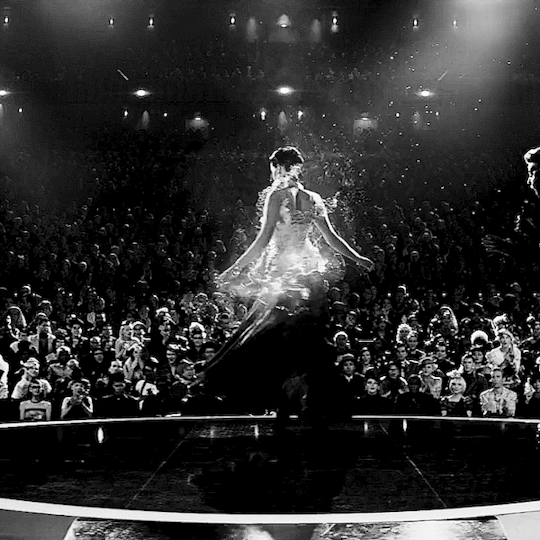
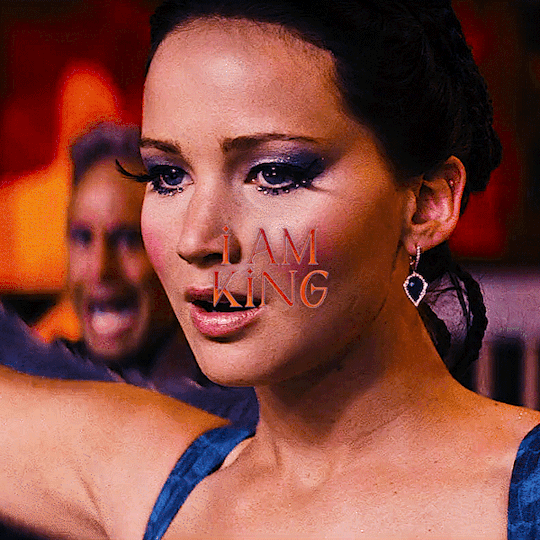
the very thing you're best at is the thing that hurts the most
1K notes
·
View notes
Text

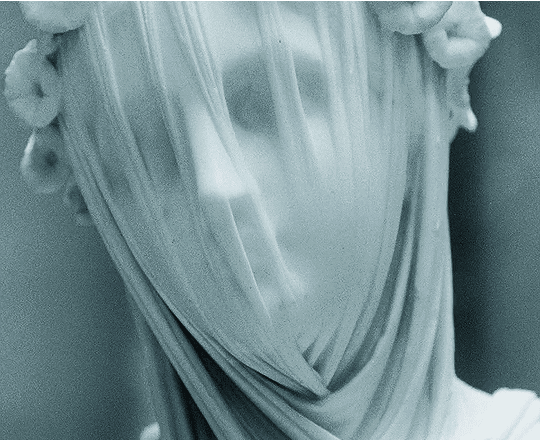


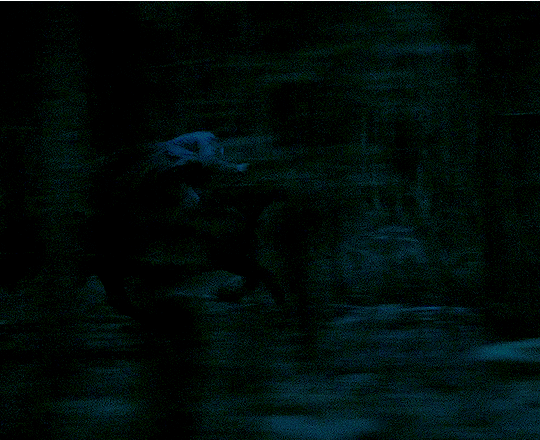
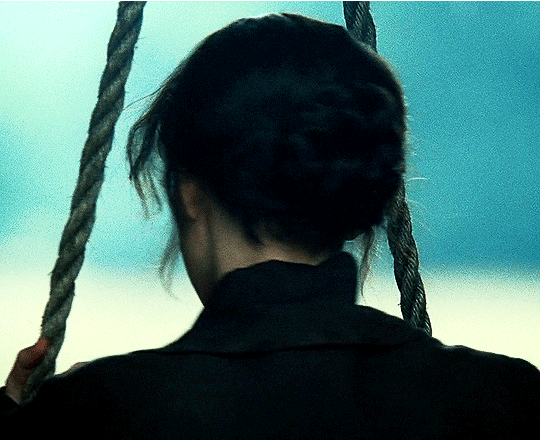

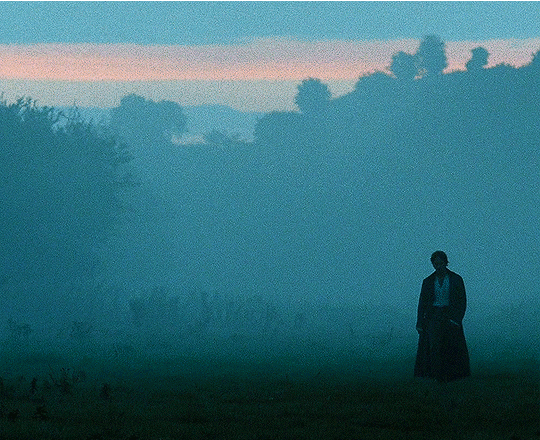
I'm very fond of walking. Yes. Yes, I know.
Pride & Prejudice (2005) dir. Joe Wright
6K notes
·
View notes
Photo
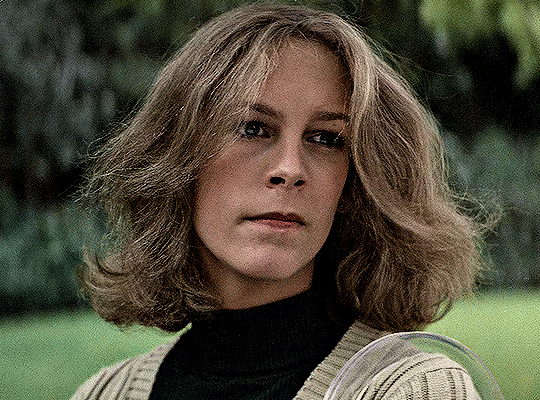



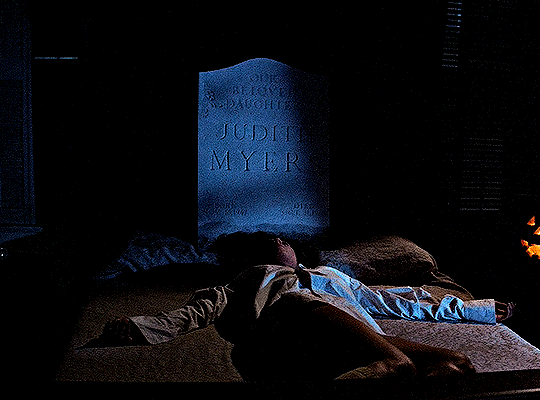
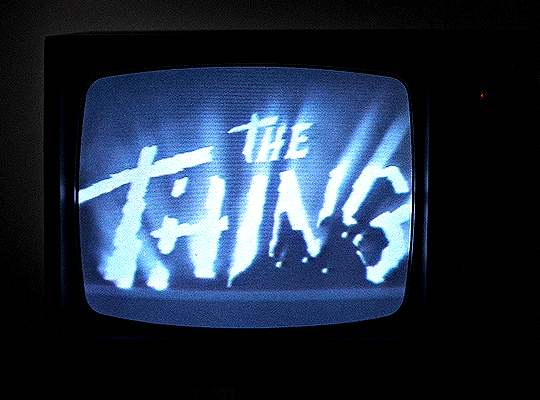

You know, it’s Halloween. I guess everyone’s entitled to one good scare.
HALLOWEEN (1978) dir. John Carpenter
2K notes
·
View notes
Text

Or, A Retrospective Quest to Find my Favorite Book
(originally posted @ Page and Panel on wordpress)
For anyone who considers themselves a “reader,” there is a single question that we all dread being asked but secretly love answering. What is your favorite book? Do you have a few books on hand to rattle off at a moments notice or do you shrug and say that you don’t have one? Do you tailor your answer to the person asking the question or you have a single, absolute, definitive favorite that you sing the praises of any time you’re given the chance? I, like most people I’m sure, have given different variations of these answers over the years along with dozens of others. Realistically, if you ask me this question my answer will change given the time of day, my mood, and the direction of the winds. And that’s totally fine. But I’m trying to generate content here so I want to interrogate this question a little. Or a lot.

Baby’s First Bookstagram Post ^
I started actively tracking my reading in 2017 on Instagram. Scroll all the way down on my page if you want to see some truly uninspired photography, but also if you want to be shocked at how consistently I posted when I was using that as my primary tracking method. I have a nearly infallible log of everything I’ve read in the last five years. According to Goodreads, I’ve read a total of 688 books between January 1st, 2017 and December 4, 2021. That’s absolutely more books read in the last five years than in the entire rest of my previous 25 years of life. That’s a lot of content to condense into such a small span of time and I already know my brain hasn’t retained all of it.
Running the numbers like this has left me with two questions I want to explore:
How many of these books do I actually remember?
Which of these books is actually my favorite?
And that’s what this series of blog posts is going to explore. I am going to be re-examining books I’ve read and logged, maybe dipping in to re-read or skim a few here and there to see if my opinion has changed. I want to see how actively I have been reading over the years, or if I’ve truly gotten sucked into the social media gamification of reading where I’m just burning through books to hit a goal. And, because I love a list, I’m going to be ranking the books I revisit in a quest to figure out which is my definitive favorite. Or if such a thing even exists.
Where was I in January of 2017? Well, let’s check the caption on my very first official “bookstagram” post:
“2016 was a trash fire in the middle of a shit storm for me. So one of my goals this year is to read more and to read every day. Earlier today, I decided I might as well chronicle this effort on Instagram. So here is the pile of stuff I read yesterday.” (JANUARY 2, 2017)
Yeah so that about sums it up. I was struggling to recover from the gut punch that was the 2020 election (still recovering), dragging myself through my last two semesters of college (remember not having student loan payments?) , and working full time at my local comic store (still the best job I’ve ever had). I think it hit me that over the previous few years I had only really been reading books for class–English Major life–and comics because that was my life at the time. And I really wanted to expand my reading life. Thus, I started logging my books and trying to read a little every day. The first few books I finished that year were actually comics so bare with me.
Book One: Midnighter and Apollo
written by Steve Orlando with art by Fernando Blanco.
Let me start off by explaining that the way I’ve tracked my comics over the years is by bundling single issues (aka the 20 page floppy magazine style books that come out every week) as they are released in trade paperbacks (aka graphic novels that collect 5-7 single issues in a single bound book). i feel like doing it this way gives me a more realistic number at the end of the year, given I read hundreds of 20-ish page comics a year.
Midnighter and Apollo is Steve Orlando’s follow up miniseries to his run on Midnighter (Vol 2 2015-2016). I’ll be the first to admit that I am not a big DC comics reader. I have a few characters that I like to dip in and out of whenever they show up in books, but I grew up on Marvel and never really made the jump to being a fully dedicated DC fan. However, this was an era of DC comics that I actually really loved and Midnighter is one of those characters that will always get me to pick up a book. The incredibly reductive elevator pitch for Midnighter as a character is that he’s Gay Murder Batman. And if you’re not on board with that, then you’re on the wrong blog, my friend.

I absolutely loved Orlando’s run on Midnighter and this miniseries was just as thrilling. The basic plot, without giving too much away and without digging into all of the minutiae of a character written inconsistently for the last 11 years, is a To Hell and Back For Love kinda story. Apollo is abducted and Midnighter has to fight his way through literal Hell (fire and brimstone actual Hell, not metaphorical hell) to get him back.
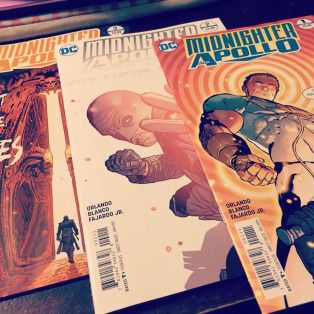
The book reunited the couple who had been married in 2002 but separated and largely absent from comics for the last few years. Coming off a run of comics that I loved, I think I was a little annoyed by the reunion and then unceremonious shelving of these characters after this series. Particularly because 2015 had been kind of a good year for gay comics. Midnighter was having a good active run, consistently showing up in Grayson (Nightwing’s comic when he was a spy for a minute) as well as having his own title. Over at Marvel, Iceman would come out as gay in November of the same year. Not quite as groundbreaking as back to back bisexual Robin and Superman 2.0 announcements, but we were still begging for crumbs in mainstream comics back then. It was fun to pick up a comic every month and watch a gay man have to leave a Tinder date to go murder a bad guy. But Midnighter and Apollo reset the character to a status quo with most queer characters of the time.
Instead of letting a queer character be single, date around, and live their lives like many straight characters are allowed to do, gay characters in superhero comics tend to be coupled up and desexualized to the point that their can easily be overlooked by people who don’t want to see it. Northstar of Alpha Flight and X-Men was married to his partner, a human dude named Kyle, in Astonishing X-Men #51 (2012) in the first gay marriage in superhero comics. Post-wedding, the two rarely appeared in comics until very recently. Additionally, everyone’s favorite gay couple at Marvel–Wiccan and Hulkling–have been together since their very first appearance in Young Avengers Vol 1 in 2005. After their initial appearance in that series, they wouldn’t be seen again with any regularity until Young Avengers Vol 2 in 2013. Consistently, gay men at the time were coupled up and pushed out of major story lines to cater to an assumed straight male comics readership.
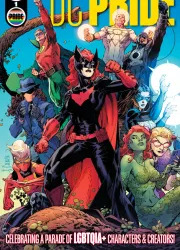
Obviously I’m never going to be mad about happy gay couples living their happy gay lives, but this desexualization of queer men to make them more palatable felt like a step back for the direction Midnighter had been going in his own series. I also think that it’s important to note that Steve Orlando is a queer man who has written almost exclusively queer comics. I also don’t know how much publisher influence there was over the decision to put the couple back together verses how much Orlando actually wanted this couple to be together. Regardless of my skepticism and whatever decisions were made by who, I did end up loving this six issue run of comics. I was already pretty committed to reading everything Orlando wrote, but this cemented it for me. This isn’t the last of his comics that will pop up throughout this project. I am also always on the look out for new Midnighter content. In 2021 he found his way back to the spotlight in at least two comics: DC Pride #1 and Midnighter Annual #1.
When I read this originally, I gave it 4 stars on Goodreads and I think that’s still a pretty solid rating. I know it’s going to rank somewhere in the middle of my extremely top heavy list. Overall, I highly recommend this series to anyone interested in getting into queer DC comics, but I would also advise starting with with the original series, Midnighter (2015) as well as Grayson (2015) by Tom King, Tim Seeley, and Mikel Janín. I definitely want to carve out some time to revisit both of these series in the very near future to see how they hold up and where they will rank on the list.
BOOK TWO: SHADE THE CHANGING GIRL
written by Cecil Castellucci with art by Marley Zarcone
Unlike Midnighter and Apollo, this is an ongoing series rather than just a mini-series. As I said earlier, for the purpose of logging comics, I bundle them in as they’re collected in trades. So, Midnighter and Apollo is issues #1-6 for the complete story. Most comics on this list are going to be broken up into similarly sized chunks, but will have multiple volumes. So, Shade the Changing Girl has a Volume 1 (collecting issues 1-6) and a Volume 2 (issues 7-13). For the purposes of this project though, I’m counting all 13 issues as a single story, and will treat most runs of comics the same way. Every new #1 is a new story, etc etc. Hopefully that’s enough explaining my own process for this post.


Cecil Castellucci draws just enough from the original series to capture the utter madness of Milligan and Bachalo’s Shade, but create such a fascinating character in Loma that you don’t actually need to read the original series to get deeply invested in this new one (which is probably for the best because I doubt Shade the Changing Man holds up). And Marley Zarcone’s art is beautiful and creates the perfect atmosphere to tell this weird ass story. I can’t tell you how many times I sat down with these issues and ended up just staring at the art. And in Volume 2, there’s a breathtakingly beautiful issue drawn by Margurite Sauvage, one of my all time favorite artists.
I honestly don’t think Loma has popped up in any comics since the sequel to this series, Shade the Changing Woman (we’ll get to it), which is a shame because I would buy literally anything else with her on the cover. I also really miss this era of comics. Vertigo has made every attempts at a comeback since the glory days in the 90s. Young Animals, I think, is the closest they ever got. After a first phase of comics (they’ll all be on the list at some point) that all lasted about 12 issues, a cross over event, and then a second phase of 5-6 issue mini series, the entire Young Animal imprint was scrapped and DC attempted to revitalize the Vertigo brand. None of those books ever took off (and none of them were very good) and DC has since scrapped the entire like altogether in favor of their “Black Label” imprint. In my opinion, Young Animal is the closest DC ever got to the classic Vertigo books I was obsessed with in high school. But money talks and sales for his books never really took off. I think we sold 5 or 6 issues of Shade ever week, despite my best effort to hand sell it. So pour one out for Gerard Way and his weird comics.
Unsurprising, I gave both installments of this series 5 stars and I stand by that. I can’t recommend this highly enough and it’s definitely getting ranked above Midnighter and Apollo. Seriously, I’m sure you can find the back issues of this so cheap in any comic store dollar bin or on Comixology for a discount. Even if you’re not a big comic reader, this one and it’s sequel are perfectly self-contained stories and absolutely worth checking out.
BOOK TWO: ARISTOTLE AND DANTE DISCOVER THE SECRETS OF THE UNIVERSE
by Benjamin Alire Sáenz
Finally! An actual novel. I promise the comics thin themselves out in 2018 when I stop working at the comic store.
What is there to be said about Aristotle and Dante that hasn’t already been covered by anyone who has ever read a book? Seriously, you’ve all read this right? I don’t need to talk you into it. Somehow I had made it to 25 without reading this absolute classic of a Queer YA novel. I’ve actually been meaning to reread this one all year and haven’t quite gotten around to it. Maybe it will be the next book I pick up and we can end this year on a high note.

Aristotle and Dante is the story of two very different boys from two very different backgrounds. And against the odds, they form an incredible bond, becoming close friends and eventually something more. One of my favorite things about this book, and one of the things I think about constantly when I read other queer stories, is the relationship between Aristotle and his parents. Aristotle is going through a turbulent time of self-discovery, trying to figure out the kind of person he’s going to be. And there is never a point in the story in which his parents, specifically his father, abandon him in that journey. It’s exhausting to see queer teens in stories abandoned, neglected, or abused by their families. Seeing that love on the page remain strong and unquestioning, especially as they come to a collective realization about the person Aristotle is growing up to be, is deeply affirming and refreshing.
I didn’t grow up with ready access to a lot of queer media, especially media aimed at younger audiences. I learned about gay things like every other middle school kid in the early 2000s: on Degrassi: The Next Generation and roleplaying X-Men characters on Xanga. And as an adult, I don’t read a ton of YA but I will almost always pick up anything queer. I love that these books are available to kids as they learn about themselves. And more than anything I love the care with which Sáenz handles these characters and their lives. You can feel his affection for Ari and Dante in every word. This is a book that is swelling with emotion invites readers to really feel their own vulnerability along with these characters.
I have this as a 5 star read. Fantastic call on my part. Of the books entering the list today, this is the one that I feel the most emotional attachment towards so I’m slipping it in at the number one spot. I wish I had more to say about this book except that I absolutely adore it and I can’t wait to read the sequel (waiting for the paperback release so my books match is so stressful). If this has been sitting on your TBR for a while bump it up to the top. For now, I’ll leave you with a quote I took a picture of for instagram that I do think about pretty regularly. It feels like a fresh gut punch every time I read it.

WRAPPING IT UP
Okay so the fun part of all of this is coming out with a ranked list of books I’ve read. Okay maybe that’s just fun for me. I’m going to keep a running google doc list and insert the books I talk about wherever I think they should go on the list. This one is going to be pretty easy, since the only books entering the list are the three I talked about in this post.

There’s not a ton to wrap up on the first installment in this project. Nothing super controversial here. Just one popular YA book that everyone has read and two comic series no one has read. I’m excited to see how this pans out and where I land on books I haven’t thought about in a while. Next time I have two more comic series and one of my all time favorite novels to add to the list. The next few posts are going to be pretty comics heavy, so hopefully no one is totally put off by that content. I promise, they fade out by the end of the year.
#midnighter and apollo#shade the changing girl#aristotele and dante#bookblr#books and reading#too all the books
1 note
·
View note
Text

(originally posted @ Page and Panel on wordpress)
Per my last post, everyone knows it’s been a while since I’ve posted regularly here. But I’m working on getting back at it so where better than with my Marvel Read Through.
But first a correction: In my first Marvel post, I claimed that it contained the first three years of continuity. Well, that was a lie. I’ve been reading these comics in chunks of around 20-30 issues at a time and I thought I could reasonably cram 20 issues of continuity into a single post and still have it be readable. That was also a lie. Instead of 20, I ended up covering only six comics. But once I came to my senses, I forgot to go back and change my intro. You think I proofread these posts before I send them out into the world? Absolutely not. We write like college English majors submitting a paper 15 minutes before the deadline or we don’t write at all!
That being said, we are starting off in July of 1962, Almost a full year since Fantastic Four #1 was published. Marvel won’t churn out the volume of comics we see today for another several years and we’re lucky if we see one or two comics a month, let alone a dozen titles a week. I also want to get better about doing credits in this. For now we mostly just see the team of Stan Lee and Jack Kirby at the head of every book. But, we have letterers and inkers to acknowledge and after this post, I think, we’re going to see a mix up on some creative teams. Best to get into the habit now.
The Incredible Hulk
The Incredible Hulk #2 (published July 1962; story by Stan Lee, art by Jack Kirby; letters by Artie Simek, inks by Steve Ditko) opens with Hulk wandering aimlessly through a swamp, headed for a small town. A sheriff spots him and alerts everyone to take shelter and calls back up. A bunch of sheriffs try to take Hulk down, but obviously fail.
Thankfully, Rick Jones arrives on scene and is able to calm Hulk down and lead him away, apparently using the earliest known version of Natasha’s weirdo “lullaby” from Avengers: Age of Ultron (2015). How it evolved into *sexy voice* “The sun’s gettin’ real low…” or whatever, is beyond me. And I can’t relive that awful movie or that shoe-horned in fanfic relationship again, so let’s just move on.
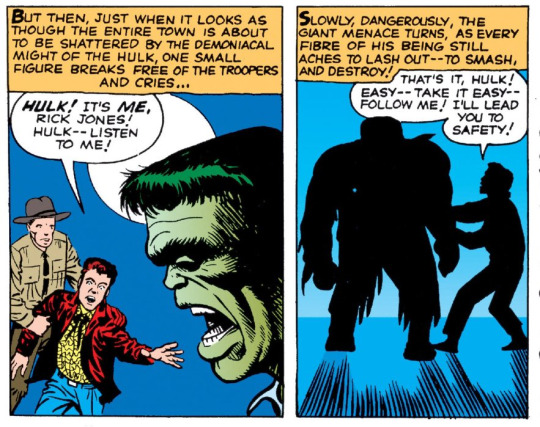
Jones manages to coax Hulk to safety and the next morning he’s back to being regular Bruce Banner. Bruce begs Rick to just leave him because he knows he’ll never be able to control the Hulk. Rick refuses to abandon him though. There’s a lot of guilt here and Rick clearly blames himself, as the accident that created the Hulk was during Bruce’s attempt to save Rick’s life. So, I guess they’re just trauma bonded forever. That seems healthy.
We cut away from the emo-est boys of 1962 because, elsewhere, a spaceship has landed. These aliens are aptly named The Toad Men.
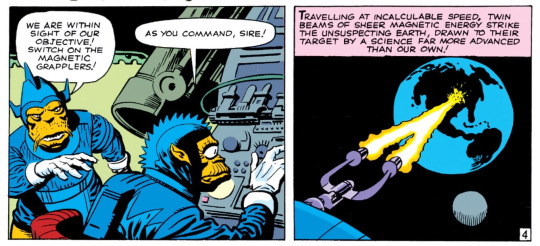
They have come seeking the “most brilliant scientific mind on Earth.” And that just so happens to be Bruce Banner. Though, we also have the same claim made by Reed Richards and Hank Pym, so I’m curious what metrics everyone is using. Can we get a proper rubric and a ranking system for this? In a few decades we’ll get periodically updated lists from Marvel on who the smartest people in the universe are, but these three tend to stick somewhere close to the top. Anyway, the Toad Men are here to decide if the smartest man on the planet is enough to resist their planned invasion of Earth. They find Banner and Jones in the Hulk Cave that Banner has set up to contain himself at night. The two are captured and taken aboard the Toad Men’s ship.
The leader of the Toad Men, Torrak, spills their whole plan to Banner and Jones and claims that because they have mastered the magic of magnetism, they cannot be defeated. Magneto is calling from 1963 and he says hands off my schtick. Banner refuses to talk and, because he’s of no use to them, Torrak ejects Rick Jones from the ship in a plastic tube back to Earth. Smart idea to tell a guy your whole plan and then send him home for help, I guess.

On the ground, the US Military has decided to use the classic soft touch both the Hulk and the Military are known for. By launching missiles at an unknown ship and bringing it to crash down in the desert. I’m glad even in the 60s, the US Military was known for being incredibly diplomatic and never following the orders of an absolute blowhard who wants to shoot first and question later….
The ship comes down and because it’s daytime back on earth, the Hulk is gone, leaving Banner in the wreckage. The Toad Men have tunneled underground to escape, leaving behind a scene doesn’t look great for our hero. Ross has Banner arrested for treason because he’s too busy nursing a personal grudge and inferiority complex to ask whether or not he was on the ship willingly. And while Betty Ross tries to plead for Banner’s release, more ships appear in the sky. The Toad King has taken over Earth’s airwaves to announce the incoming invasion. Using magnets, the Toad Men will pull the Moon closer to the planet and unless the people of earth surrender, they will let the moon crash into Earth and kill everyone. Not a great use of a planets’ resources or even really a sustainable invasion, but I guess live your life.
That night, Bruce Banner watches the sun go down and laments what has become of him in, honestly, some of my favorite panels in any of these comics so far.

As the Hulk, he’s able to escape prison and goes hunting for Ross. He ends up at their house where he startles Betty. Ross calls in some soldiers and a tank to the stand-off basically happening in his living room. Hulk escapes with Betty in one of the absolute funniest panels ever. (Ya’ll, Jack Kirby came to play on this book)
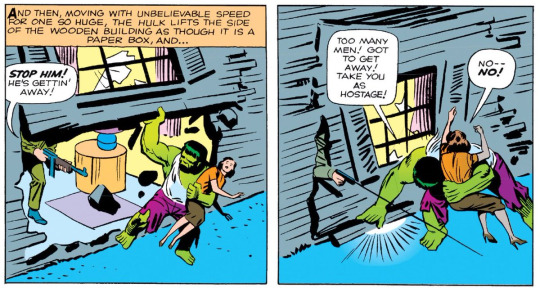
Hulk escapes the fight, kidnapping Betty and taking her back to his lap. Betty demands to know why Hulk hates them so much. And Hulk responds with basically “You keep trying to kill me obviously I hate you!” Rick tries to reason with Hulk but fails. Thankfully the sun rises and Hulk becomes Bruce once more.
With the Toad Men’s fleet still hovering over the Earth, Bruce realizes he must use the Gamma Gun he’s created on them. Suspense builds, as no one knows how Gamma will react with magnets! Bruce readies the gun while Rick holds back the soldiers. Thankfully it works and Bruce is declared a hero and cleared of treason. No one seems to question why they followed the Hulk to Bruce’s lap or why the Hulk is gone or how Bruce got out of prison. But at least the Moon isn’t going to crash into the Earth anymore so we’ll take the Ws where we can get them. The only person who suspects the Bruce/Hulk connection is Thunderbolt Ross, but he’s an asshole anyway. And no one really has to worry about the Toad Men because, unlike the Skrulls, we’ll never see this alien race again.
Fantastic Four
Once again, we get a main player in the Marvel Universe introduced SUPER early in Fantastic Four continuity. Fantastic Four #5 (July 1962; story by Stan lee, art by Jack Kirby, inks by Joe Sinnott, colors by Stan Goldberg, letters by Artie Simek) gives us the glorious introduction to Doctor Doom! And on a full splash page, no less.
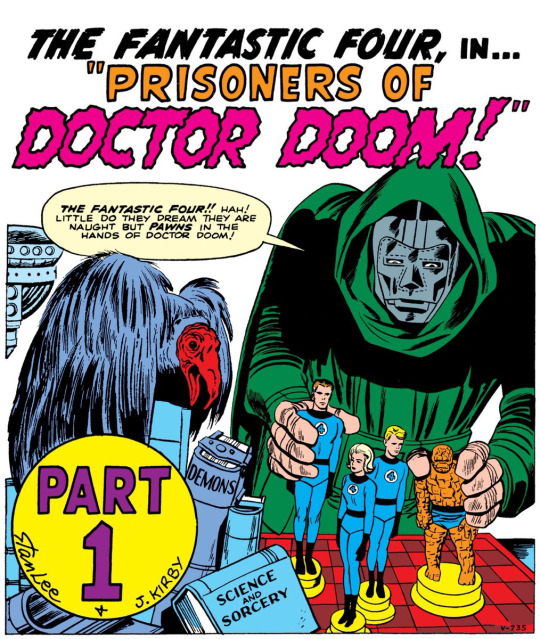
We’ll get to him in a minute. For now he’s just going to hang out with his pet vulture and play Fantastic Four Barbies TM.
Reed, Sue, Johnny, and Ben are chilling at the Baxter Building, as they do when they’re waiting for the story to get going. Johnny is reading an in universe copy of The Incredible Hulk, which is a really cool way to advertise your new book and I actually really do love it. Even if it does break continuity a little in a few issues.
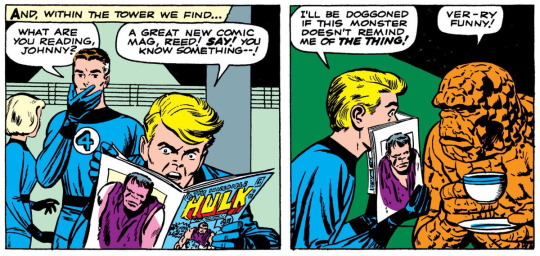
Johnny harasses Ben a little, even though Ben is simply trying to enjoy his morning tea. The fight like they always do and it ends with a comic book on fire. Always the parents of the group, Reed and Sue pull them apart before they can actually fight each other. Classic FF opening shenanigans.

Reed Richards into rope play? More likely than you think. 😏
Suddenly, the lights go out in the Baxter Building despite being connected to a generator. A net drops over the entire building. 🚨ASBESTOS WATCH🚨 Johnny remarks that he cannot burn through it because it’s made of Asbestos. Seriously hope Johnny got in on those law suits and/or the smartest man in the universe helps get him some fresh lungs in a decade or two. Anyway, it’s the moment we’ve all been waiting for! Enter Doctor Doom! Who has apparently decided it’s time to stop playing with his action figures and come deal with the real Fantastic Four. From his helicopter, he calls out to them and Reed immediately recognizes the voice.

Cue flashback:
Victor Von Doom and Reed Richards were college roommates. But Doom’s interest in sorcery proved to be his downfall. During an experiment to communicate with the dead, Doom sets off an explosion and is expelled from school. More on that eventually.
For now, Doom demands to take Sue as a hostage and she agrees. Once she’s on his ship, he binds her and then demands the rest of the FF board the ship and promise not to attack him. It seems like he probably could have just bound them all up to ensure that no one had their fingers cross, but whatever. It’s his party and we’re all just invited along for the ride. He does put them in a cage though, and takes them to his castle.
This is where we find out that Doctor Doom has invented Time Travel, thus beginning a long and storied history of Time Fuckary in the Marvel Universe. His plan is to send them on a quest in pirate times to procure Blackbeard’s treasure for him. Why can’t he just rob a bank? Good question. Couldn’t tell you.

But in order to save Sue, the rest of the team must agree to this. They go back in time and land in a port where two pirates are conveniently arguing over a pile of period appropriate costumes and fake beards. Ben scares the men away and the three of them suit up to blend in, I guess.
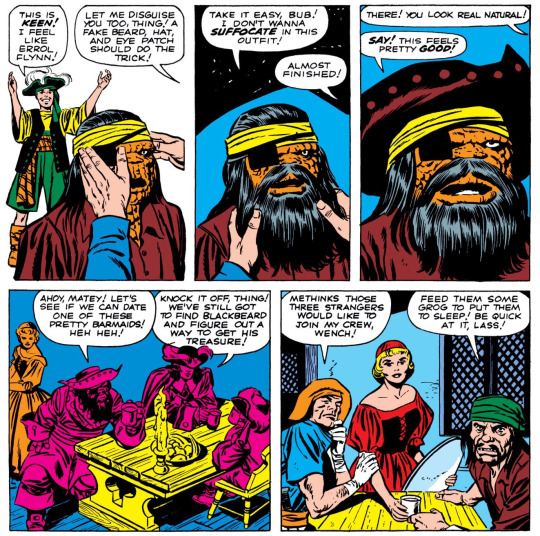
Why do they have wigs and fake beards? Good question. Why does Ben conveniently get black hair and a black beard? Isn’t he getting super into character for a thing they don’t actually want to do? I know what you’re thinking. And trust me, we’ll get there. I promise the pay off is everything you want it to be and more.
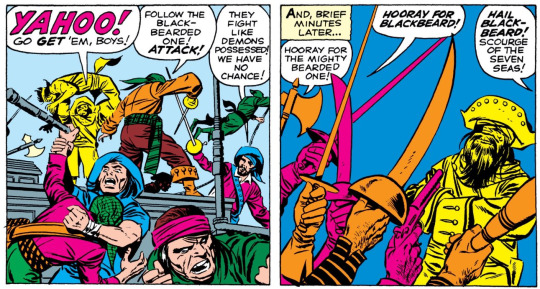
Yeah. Ben Grimm was Blackbeard all along. I love comics.
After the fight, they acquire Blackbeard’s treasure and Reed points out that they only agreed to give Doom the chest, not the treasure inside. And that is technically correct, the best kind of correct. So they quickly exchange the riches for chains.
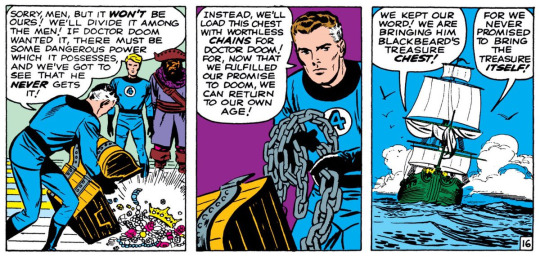
Ben, reveling in his new-found fame, announces that he will not be returning with Reed and Johnny. He claims that there is nothing for him in their time, but at least here he’s made something of himself. To ensure that the other two can’t drag him back to their home time, he orders his crew to soak Johnny with water and wraps Richard in a sail. While he’s preparing to set his two friends loose on the open sea in a lifeboat, a cyclone hits the ship and destroys it. Thus Reed, Johnny, Ben, and the treasure chest all wash ashore.
A time portal opens above them and they are all brought back to the present along with the treasure chest. Doom explains that the reason he couldn’t simply rob a bank is because the treasure contains gems enchanted by Merlin that will make him invincible. When he opens the chest to find nothing but chains, Ben attacks. His punch destroy’s Doom’s armor, revealing that he was nothing more than a robot all along. I can’t believe we got Doombots on Doom’s first appearance. Again, I love comics.
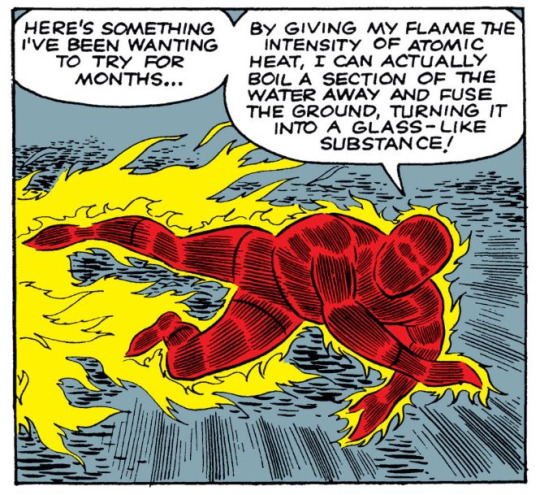
Doom appears on a screen from another part of the castle where he still has Sue Storm hostage. But she’s not going down without a fight. Turning invisible, she manages to short circuit Doom’s control panel and cause an explosion. She escapes and reunites with the rest of the team. Reed, because he’s definitely in the top three ranking of smartest men on Earth, says it’s not worth trying to capture Doom who very likely has traps set up all around his castle. So the Fantastic Four escape through an alligator infested mote in an absolutely nonsense way that prove to me that neither Stan Lee nor Johnny Storm understand how fire works.
Regardless, the team escapes. And once they’re safely out of the castle, Johnny sets it on fire. Because apparently he’s fully trying to murder Doom. Which, I get it. But it kinda goes against the hero code we know and love where heroes don’t actually kill the bad guys. That’s anti-hero territory and we’re a long way off from Frank Castle, still.
The team watches Doom blast out of the castle with a jetpack. We’ll be see him again very soon and for the rest of continuity.
Amazing Spider-Man
Okay technically this is Amazing Fantasy #15 (August 1962; story by Stan Lee and Steve Ditko, art by Steve Ditko, colors by Stan Goldberg, letters by Artie Simek) but it’s the first appearance of Spider-Man and the only issue of Amazing Fantasy I’m going to read so it’s basically Amazing Spider-Man #0. Everyone knows this origin story. We’ve seen Uncle Ben bleed out in the streets almost as many times as we’ve seen Martha Wayne’s pearls artfully break and scatter in a Gotham alleyway. But here it is, one more time, for the sake of continuity

Peter Parker is an unassuming high school student. He’s an outcast an deemed a “professional wall flower” by his peers. We open with a group of kids talking about going to a dance they would never in a million years invite Peter to. And I know we’re supposed to think these kids are mean and they’re bullying poor Pete. But let’s be honest, Steve Ditko can’t draw teenagers and Peter looks like a 40 year old divorced math teacher. I wouldn’t want to invite him to the dance either.
And it makes sense that Peter is 40 because Aunt May and Uncle Ben are like 110. Seriously Ditko? Why are they so old? Where did you learn to draw people of varying ages? I don’t love Ditko’s art in this as much as I’ve enjoyed Kirby’s on everything else. But he’s really going to shine when he gets to Doctor Strange so I’m holding out for those issues and hoping he’s learned how to draw someone in their late 20s/early 30s by then.
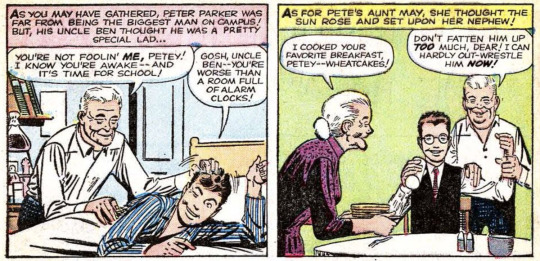
Peter lives with his only living relatives, Aunt May and Uncle Ben. They’re poor but happy and peter is well loved. We don’t learn yet what happened to his parents or how he ended up with his Aunt and Uncle, but that’s not important right now.
Instead of going to dances with teenagers, 40 year old divorced math teacher getting his groove back attends demonstrations of radioactive rays. While watching the demonstration, Peter doesn’t notice a spider drop down onto him until it’s too late. This is literally my worst nightmare I would simply cease to exist.
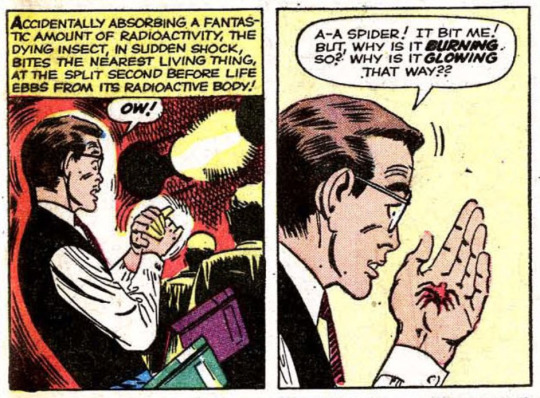
Peter handles it a little better than I would, though. The spider dies and, feeling a little lightheaded, Peter leaves the demonstration early. Nothing out of the ordinary there…
Side note: Steve Ditko also can’t draw spiders. Can Steve Ditko just not draw? Something to think about.
On his way home he almost gets hit by a car and when he goes to jump out of the way, he discovers that he can jump much further than he thought. He plays around with his powers for a bit, testing their limits and possibilities. He’s strong, he’s fast, he can climb walls. Does whatever a spider can, etc etc. You know the drill.

Later, using his new powers, Peter enters a wrestling match as the “Masked Marvel” and win’s $100. After the match, he is greeted by a TV producer and invited to join him in show business, like you do. Put a pin in that. Because now it’s time for a comic book style make-over montage. Peter goes home to make himself a costume. Project Runway, look out. It’s actually a pretty cool black and red suit. If you’ve seen one Spider-Man costume, you’ve seen them all. This one has the web-wings that don’t make it into every version but still look pretty cool here.
He also makes himself a batch of what he calls web fluid. No real explanation as to how or what it’s made of. But when you’re a 40 year old divorced math teacher with an interest in radiation, you’ve probably got a lot of stuff laying around to whip something up.
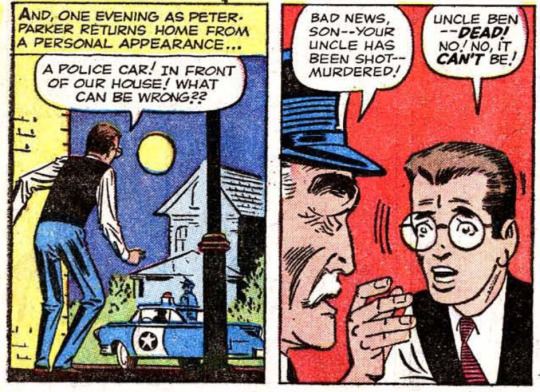
Later, Spider-Man has become a celebrity wrestler. One night he goes back stage to see guards chasing a thief and gives them the most fateful “Not my problem, I just work here” in history. Because as fate would have it, a few days later Spider-Man learns that his uncle has been killed by a burglar. Peter puts on his costume and chases the man to an empty warehouse. A fight ensures, the man pulls a gun that peter blasts with web. When he sees the man’s face, Peter realizes that this is not just any burglar, though. It is the same thief Spider-Man let escape.
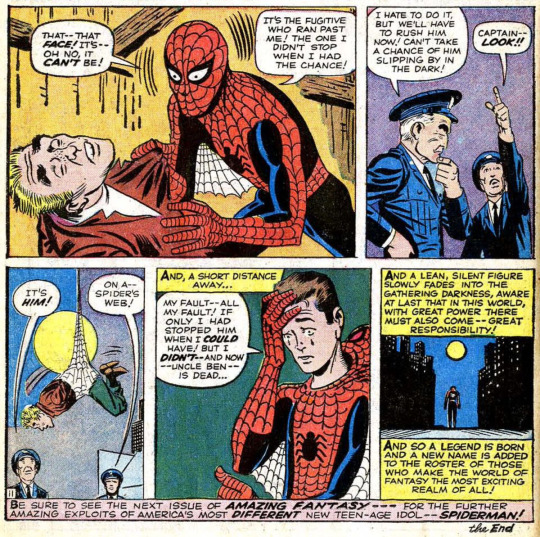
Peter leaves the burglar wrapped in web for the police to find and goes home to ponder exactly what great responsibility comes with this great power. And that’s the last we’ll see of him for a while. Amazing Spider-Man #1 comes out in March of 63–a year in real time, several recap blog posts from now in my time.
Journey Into Mystery
That brings us to our last first appearance of a new hero for a while: Journey into Mystery #83 (August 1962; story by Stan Lee and Larry Lieber, art by Jack Kirby, inks by Joe Sinnott, colors by Stan Goldberg, and letters by Artie Simek) introduces us to… Donald Blake? No, that can’t be right. The story promised Thor and the Stone Men from Saturn! So, if you’re only familiar with Thor from the movies live I was, and had never really dipped into Thor comics written before a certain point, it was pretty surprising to find that Thor also used to have an alter-ego. In my head, Thor is just Thor. I read a lot of Walt Simonson’s Thor run from the 80s, Jason Aaron’s run from the last decade, and I had known about Blake in passing, but mostly through modern stuff addressing prior retcons. I didn’t realize that for the first several years of being a character, Thor was basically just a costume worn by Donald Blake, and not the other what around. And, yeah, it’s a little more complicated than a costume, but still.
The story opens with our introduction to Donald Blake, a doctor from the US who uses a cane to walk, on vacation in Norway. Conveniently also visiting Norway, are a bunch of rock aliens from Saturn (who kinda look like Ben Grimm painted green. Maybe Ben should go be on Saturn for a while?). Blake overhears a fisherman telling locals about the rock monsters, but no one seems to believe him. Blake decides to go look for himself and, sure enough, rock aliens. He steps on a twig while attempting to run away from the aliens. Obviously the aliens hear it and chase after him. And I’m just going to say it here, Donald Blake is not in the running for smartest scientist in the world. Reed, Hank, and Bruce can all rest easy knowing they’re definitely top three for the time being.

Blake runs for the hills–literally. He loses his cane and takes shelter in a cave. Unfortunately, the exit is blocked off so he’s basically trapped. Until! Magically a secret door opens to a chamber with a fresh new walking stick just lying on a pedestal. *Cardi B Voice* That’s suspicious. That’s weird. Not quite smartest man on earth smart, but smarter than your average bear smart, Blake decides to try to use the cane as a lever to move the boulder blocking his exit. When that doesn’t work, he slams the stick against the boulder out of frustration. There’s a flash of lightning and the stick becomes a hammer. Blake has been transformed into the Norse God of Thunder: Thor.

Weird, huh?
I do like that we get a quick rundown of all of Thor’s powers as Blake slowly works them out for himself. He is super strong, meaning he can lift the boulder out of his way. He can also summon storms and he figures out that if the hammer is throne, it immediately comes back to him. Which does lead to a funny contradiction that Stan Lee will start correcting in future issues.
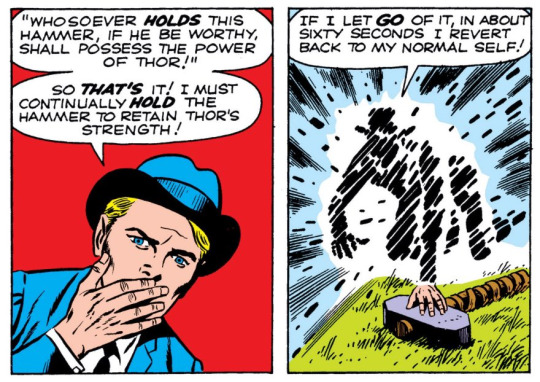
If he’s not holding the hammer, he goes back to being Blake immediately sometimes. However, if he throws it, he can stay in Thor Form long enough for it to come back to him? Stan Lee will literally give us a countdown timer for how long he can be Thor without the Hammer in his hand later. Thor’s powers as they relate to how close Blake is to the hammer is never consistent despite Stan’s best efforts and it’s so funny to me.
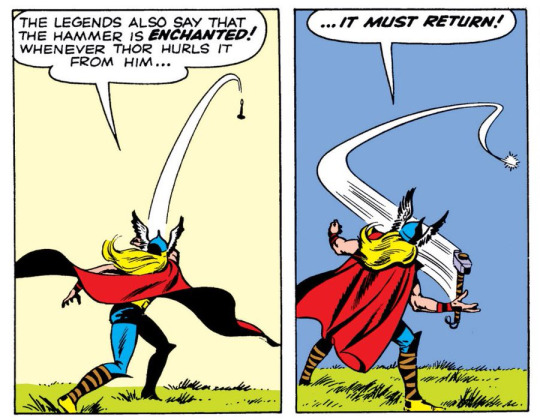
Now that he has super-powers Blake AKA Thor can go out and face the aliens, whose fleet of ships has shown up in Earth’s atmosphere. Thor attacks the aliens and breaks through all of their defenses, including an incredibly named Mechano-Monster. No match for the awesome might of Thor, they flee. Thor changes back into Dr. Bake and is fully ignored by the soldiers who come looking for the invaders.
Journey into Mystery #84 (September 1962; story by Larry Lieber, art by Jack Kirby, inks by Dick Ayers, colors by Stan Goldberg, and letters by Artie Simek) is where Mystery sort of becomes our anti-communist book. More on that when we unpack. But for now, it’s also our first appearance of Jane Nelson… I mean Foster. Yeah, Nelson doesn’t really have the same ring to it. I’m glad they circled back on that one.

Blake returns home from his trip to Europe and learns that a revolution has broken out against a Communist ruler in San Diablo. As a result, several American doctors agree to go and help, Blake among them. Obviously this is a problem for our evil Communist dictator (and kinda racist caricature), known as The Executioner. And he for sure cam by that name honestly, as we’ll see in a minute. His goal is to keep the peasants too sick and weak to overthrow his government. Which, yeah, that’s definitely what an evil dictator would do.

The other thing an evil dictator would do is send fighter jets to drop bombs on the ship carrying those doctors. Thankfully, Blake is on board. He turns into Thor and smashes the bombs out of the sky. There’s a lot of running back and forth and trying to make sure it’s clear that no one has realized that Blake is Thor despite how often Blake disappears right when Thor arrives which is actually pretty funny.
Despite The Executioner’s best efforts, the boat makes land at San Diablo and the doctors and medical staff come ashore to help the sick and injured civilians.
I was actually surprised to see the on-page display of the Executioner’s firing squad as he demonstrates to his soldier what their fate will be if they do not stop Blake and the other doctors from doing what they came to do. Even without seeing the blood and guts, this was a little brutal for an area that I mostly associate with extreme ✨camp✨.
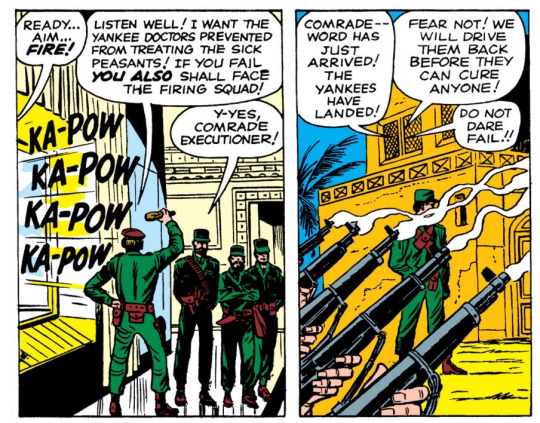
When their team is attacked again, Thor tries to fight off the soldiers. Eventually, they capture Jane and force Thor to retreat.
I do love that we get an editor’s note user manual for Mjolnir. We’ll get a lot more of these attempts to make his powers make sense because Stan Lee can’t just leave it as “it’s magic, get over it.”
Appearing as Donald Blake, Thor arrives at the Executioner’s base to demand the release of Jane Foster. Obviously, not one for following orders, The Executioner takes Blakes walking stick and orders him to the firing squad. In another “smarter than your average bear” moment, Blake challenges the dictator to fight him man to man. Laughable considering how frail Blake looks. However, Blake manages to get the walking stick away from the Executioner and transform himself into Thor once more.

The storm Thor creates washes away the soldiers as they shout out exactly what we can see happening on the page. This is a writing tick that I so closely associate with Stan Lee that I was a little surprised to only see him listed as the editor on this story. It’s definitely my least favorite thing about a lot of Silver Age comics.
While Thor is fighting off the communist soldiers, democratic forces arrive with aid, causing the communists to flee the fight. Seeing his military in shambles, The Executioner decides now is as good a time as any to cut and run. He steals a bunch of gold and tries to flee. But the communist army catches him and sentence him to his own firing squad for being a traitor. Naturally, the communists realize that the Americans have been their true friends all along and the war comes to an end. Interesting.
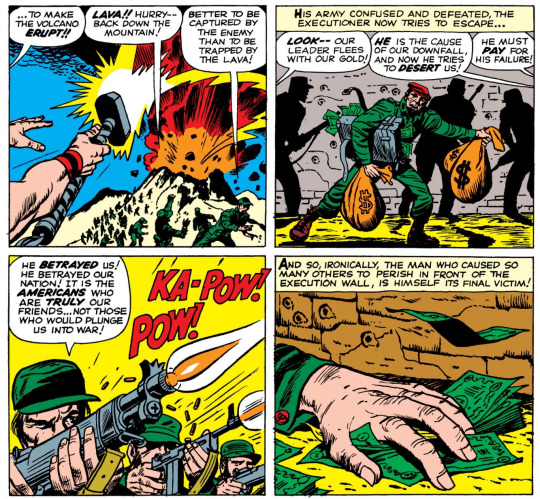
In the last few panels of the story, we are assured that no one has connected the Thor/Blake dots yet. And Jane laments that Blake will never be as brave or handsome as The Mighty Thor. So we have our third female character who still kinda only exists to be a potential love interest for our super smart hero man.
There’s a lot to unpack here.
The Hulk Is My Surprise Favorite Comic?
I hadn’t really expected Hulk to be my favorite book of the era, but after two issues it really is shaping up to take that trophy. Jack Kirby is pulling from a lot of old EC horror comics for influence here and I love it. At this point in continuity, Hulk is much more a monster comic than a superhero comic and that has to be a lot of Kirby’s doing. If you read a little about him, you’ll find that he created a lot of the famous monsters in the Marvel Universe and it kinda feels like Hulk was always supposed to fit the horror genre.
This book is also where you really get to see Kirby draw with emotion. The “camera” gets up close and personal in a way that just doesn’t happen in Fantastic Four. There are so many panels of Bruce’s horror and despair that come through so intensely. There’s also more exploration with color in this book than any other. And it’s a little hard to talk about color when I’m reading digital copies where the color and inking have been redone completely. But, there’s just a different pallet at work here. And if you dig into superhero color theory you’ll learn a lot about how heroes mostly get colored with primary colors. Lots blues and reds, specifically. And villains get secondary colors, i.e. green.
I’m just really surprised by how drawn into this book I am, when I’ve never really cared much for Hulk stories.
Aliens and Space-Exploration
We’re getting a lot of Alien invasion stories. I think that’s just a really common plot line for serialized stories in this time period. For some historical contest, we’re in the second decade of the Soviet vs US space race. most of these comics are being published just a year after the first human spaceflight. And we’re still seven years from the first man on the moon. I’m sure there was a lot of anxiety around what exactly was out there, in a space that only a very special and highly trained (despite what the Fantastic Four may think) few could go.
I also think it’s so interesting that we’re at a point where we’re about to start seeing some recycled villains, specifically in the Fantastic Four, but we have several alien invasions and no repeat invaders. In fact, none of the aliens we have seen so far will have any staying power except the Skrulls, which will eventually become a Whole Thing.
Anti-Communist Propaganda
Thor being the HARD anti-communist propaganda book is certainly a choice. I read ahead on Marvel Wiki just to see if San Diablo ever gets mentioned again and apparently it becomes a US-backed democratic state and in 1985 we’ll get a story about Captain America vs a native San Diablan who wants to fund a revolution to overthrow the American created government in his home country. Curious to see how that story is treated, and how two decades will change the way we view American interventionism. Right now, we’re still a little deep in Vietnam for some reflection.
I also didn’t really expect these books to be SO propaganda heavy in such a cringy way. And I probably should have. Stan Lee has never exactly been an iconoclast. But knowing about Kirby’s backstory and Ditko’s personal politics, it will be interesting to see how that comes through in later books.
#the incredible hulk#fantastic four#tales to astonish#spiderman#journey into mystery#marvel comics#the marvel method
2 notes
·
View notes
Text
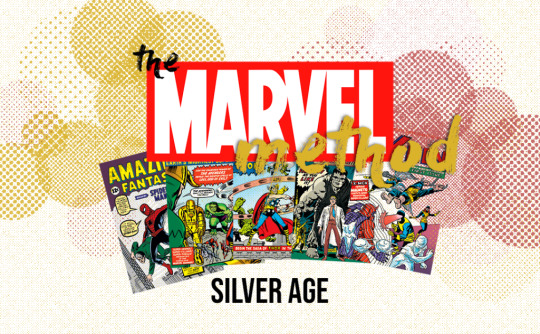
(originally posted @ Page and Panel on wordpress)
For my first post on my new attempt to ~have a blog~ I am reposting an old entry into my failed wordpress blog. My attempt to read Marvel Comics start to finish is something I am hoping to get back to in the near future. I have edited this and reformatted it for tumblr so hopefully it's not too much of a nightmare to look at but it is WAY too long.
Why in the world would anyone attempt to read more than half a century of comics? I’m fascinated by the concept of an ongoing continuity and how different writers and artists interpret characters. And the fact that so many hands have touched this project with so many different interests and priorities and yet it continues on as a cohesive (a term we’ll use loosely) and linear story is actually really cool.
There’s a lot of interesting stuff going on here so I’m going to try to write about it at regular intervals that are sometimes strategic and sometimes completely arbitrary. The first chapter of Page Main Lines Sixty Years of Marvel Comics (more clever name tbd, probably) covers the first three years of the Marvel Comics Universe designated 616. This is the main universe that has been ongoing from 1961 to every Wednesday until the world ends, probably.
Just to establish some parameters for what this project is, I’m reading Marvel Comics chronologically starting with the Silver Age, launched by Fantastic Four #1 in 1961 written by Stan Lee and drawn by Jack Kirby. There are some ongoing anthology titles carrying over from the pre-616 era that I’ll be picking up here as well because they introduce key players in the Marvel Universe (specifically Spider-Man, Ant-Man, and Thor). The Golden Age doesn’t really interest me all that much beyond its history and the characters that get carried over to the new continuity (Captain America and Namor the Submariner, most famously). And while I’m trying to read everything, I did make a decision early on to skip out on Strange Tales because I don’t really care about Johnny Storm’s solo adventures.
The format of these posts, like everything else I throw up on this blog is subject to change forever and ever. But for now, I think book by book and then covering some broad themes/connections at the end is the easiest way to tackle this.
We begin, like most stories begin, with a family of four on a trip to outer space...
Fantastic Four
Written by Stan Lee and drawn by Jack Kirby, as all Marvel Books were at the time, Fantastic Four #1 starts off in media res and we are introduced to our heroes as they drop whatever mundane activities they are doing as civilians and respond to the impending thread of Mole Man.
As each member makes their way to the scene, Stan Lee takes a step back to give us a classic origin story that is BEYOND bonkers: Reed Richards is the most brilliant scientist in the world and he absolutely must break into a government facility to fly a rocket into space. He is accompanied by his college roommate, Ben Grimm, his childhood sweetheart, Sue Storm, and her little brother, Johnny Storm. Ben, like anyone hearing this plan obviously thinks it’s stupid and crazy. But Sue Storm is quick to remind him that they, four regular civilians with no real training, absolutely have to do this because if they don’t then the Commies will win the Space Race. Because it truly wouldn’t the 60’s without some good, good anti-communist propaganda. So much more on that to come later.

They make it, miraculously. But cosmic space rays have given each of them incredible powers. Reed is stretchy, Sue is invisible (oh the metaphor), Johnny is on fire, and Ben…
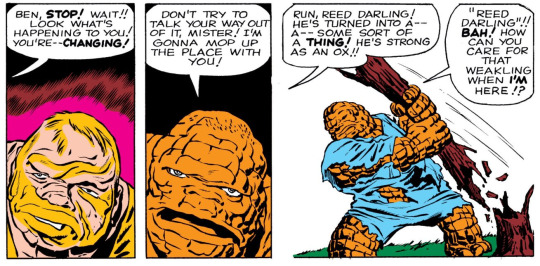
Thanks for that little nugget of a plot line. Ben actually resents Reed because he has a thing for Sue. That will go in a lot of different directions and definitely has more teeth than the time that Professor X had a thought bubble about being in love with Jean Grey, his student, that never gets mentioned again (until it does, unfortunately). But let’s put a pin in that and red string it later.
With the flashback over, our heroes arrive on Monster Isle to find Mole Man who is responsible for several cave-ins across the world. His plan is to unleash his monsters on the world to get revenge on women who weren’t interested in him. Mole Man: confirmed Incel. The Fantastic Four easily defeat Mole Man by sealing him inside a mountain and straight up killing him. I guess. Reed eulogizes their first on page enemy by saying “It’s best that way! There was no place for him in our world…” right in front of his rock monster best friend. Tough look Reed…
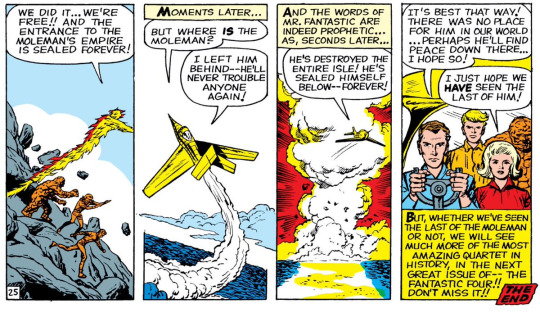
Fantastic Four #2 introduces a foe that made their on screen debut in the Captain Marvel movie: The Skrulls! I love Skrulls and truly didn’t realize that they showed up this early in continuity. In part 1, our heroes are engaging in some distinctly unheroic behavior. The Thing attacks an oil rig, Invisible Girl does a jewel heist, Mister Fantastic messes up an energy plant, and The Human Torch melts a statue made of marble. And I know I’m expecting too much from a comic in which four people take a family trip to space and come back with super powers, but it’s important to me that everyone knows that marble is heat resistant and doesn’t melt. The world, who apparently all know that the Fantastic Four exist and are totally cool with them, freak out. Are New York’s favorite heroes breaking bad!? Nah. It’s just shapeshifting aliens attempting to ruin the reputation of the only people on Earth who can stop their invasion.

The US Army, ignorant to a large scale alien invasion, is called in to deal with the threat the Fantastic Four pose. Our heroes hide out in an isolated cabin to regroup and figure out what to do. But the military surrounds them and takes them in.
Each member is put in a cell specifically designed to withstand their powers. Which seems silly because if you put an invisible woman in a regular cell, she’s still there even if she’s invisible. But whatever. This also the first appearance of Asbestos in the Marvel Universe. And if you think that’s a dumb thing to notice, you clearly didn’t grow up in the 90s, seeing commercials for Asbestos lawsuits on every single tv show. I know this stuff was in regular use in the 60s but I seriously hope Johnny was able to get in on some of those pay outs because it’s really his biggest foe in the early FF comics.

Once they break out, the team regroup to plot against the unknown foes turning the world against them. They send Johnny to sabotage a rocket launch in order to draw them out. When Skrulls disguised as Sue and Reed pick up the real Johnny instead of a Skrull, the jig is up. The Fantastic Four take the Skrulls prisoner and Reed, expert level spaceship driver, steals their rocket to travel up into space where the invading Skrull army is waiting. Reed, pretending to be a Skrull, passes off images from Marvel Comics horror/monster books Strange Tales and Journey into Mystery as real photos from Earth. He convinces the Skrull leader that Earth is simply too dangerous to invade and volunteers to stay behind.

As the rocket re-enters earths Atmosphere, they pass through more cosmic waves. This turns The Thing back into regular old Ben Grimm. But, because Ben will never catch a W, he’s a rock monster again before the spaceship lands. It’s not easy being Grimm.
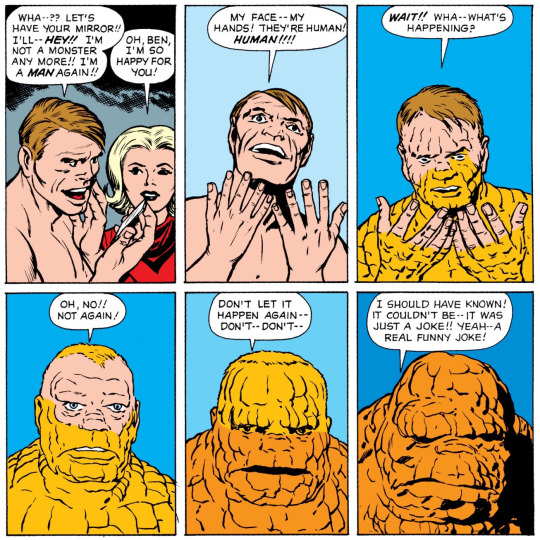
Back on earth, the question remains as to what to do with the remaining three Skrulls that Reed has taken prisoner. In another “though look my guy, Reed” moment, he decides that the only option they have to deal with aliens who can literally turn into anyone or anything is to force them to turn themselves into cows. Reed then hypnotizes the Skrull Cows into thinking they are real cows. Which is pretty fucked up and Reed should probably be considered a war criminal at this point, literally two comics in. But don’t worry. I’m sure there will absolutely never be any consequences for his actions. (Just kidding, this will be one of the catalysts for Secret Invasion in 2005. One of these Skrulls is the Emperor Skrull’s son.)
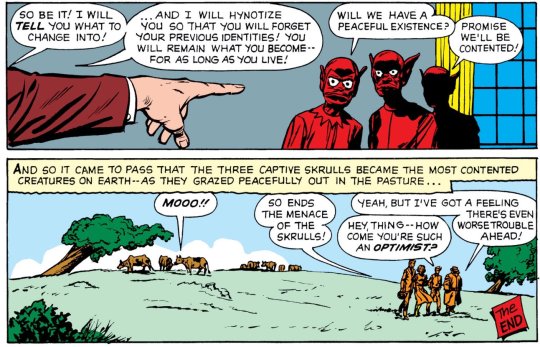
While FF #2 gave us one of Marvel’s most prominent Alien Invaders, Fantastic Four #3 is a much slower issue that doesn’t bring in much of anything. We open with our team taking in a stage show. They’re here to see the Miracle Man who promptly recognizes them and begins heckling them from stage. At this point, the Fantastic Four are basically celebrities. Though, we’re going to back track on that in a few issues, I think. He challenges The Thing to a test of their strength, which the Thing promptly loses. On their way home from the show, Reed talks about how lucky they are that Miracle Man is not a super villain. Which… you know…
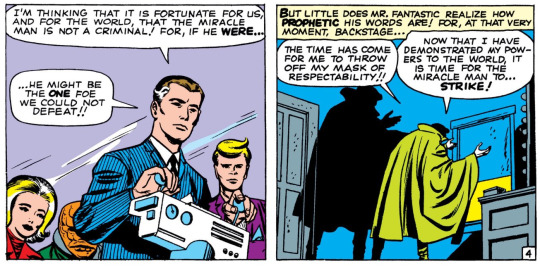
Really, there isn’t a lot that happens in the A-Plot of this issue. Miracle Man brings the monster to life, they rob a jewelry store, and then the team defeats him and everything is fine. What is way more interesting happens between the Miracle Man problem. The B-Plot of this issue is rife with conflict between the members of the Fantastic Four.
This issue isn’t the first time we see the role Sue gets shunted into as the caretaker of the boys on the team. But it is the first time she names it herself. While later interpretations of Sue will have her displaying a lot more power, right now she’s written as the mom of the team. She is the one who sews the team’s infamous costumes that, even today, have barely changed. Though, given that she made them with a material that Reed has coined “unstable molecules,” it seems she’s a perfectly capable scientist as well. Though, we’ll rarely see this aspect of her. There’s only room enough on the team for one Smartest Man in the World.

We also see tensions rise between Ben Grimm and the rest of the team. He has been a volatile figure since day one, prone to outbursts of anger and violence. It’s still unclear as to whether or not this is his pre-rock monster personality. It may also be a side effect of his powers or, justifiably, anger at being the only member of the team to get turned into a rock monster.

But anyway, Fantastic Four #4 is a much more interesting issue with one major and very precious addition to continuity:

Kidding. But this is a bit that I find absolutely hilarious. Actually, the issue opens with Johnny quitting the team after an argument. The three remaining members split up to search for him. Ben is the one who finds him working on hot rods with his friends at a garage. And, because Ben doesn’t have a gentle touch when it comes to Johnny, property damage ensues.

Thankfully before he can actually hurt Johnny, Ben suddenly changes back to his human form. It only lasts like two seconds because Stan Lee loves to torture Ben apparently.
So he’s back to his rocky self in no time. It’s actually pretty in the tragedy of getting to see him constantly being given these moments of hope, only to have them snatched away seconds later. No wonder he’s so angry all the time. But this does give Johnny a chance to escape.

Because he can’t go home, he seeks a bed for the night at what looks like a halfway house or a youth hostel in the Bowrey. Once he has secured a bed for the night, he settles in to read an old comic about the iconic 1940’s Timely Comics hero, The Sub-Mariner. When another patron notices what he’s reading, he points to a disheveled man who claims to be as strong as The Sub-Mariner. And this enters one of the absolute greatest characters in all of Marvel Canon. Just as soon as Johnny gives him a haircut with fire.
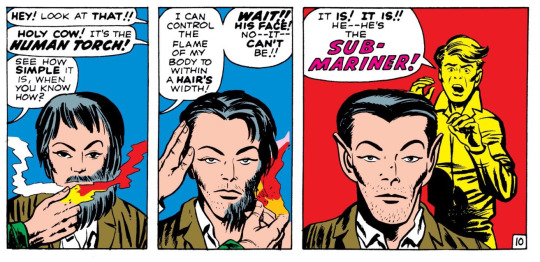
The King of Abs-Lantis has arrived and I already love him. But also, the burnt hair smell in that hostel right now… 🤢 Even though Johnny recognizes him, The Sub-Mariner himself does not seem to remember who he is. So, Johnny takes him to the ocean and basically tosses him in. Once in the water, the Sub-Mariner remembers who he is and returns to his home of Atlantis only to find it in ruins. It has been destroyed by atomic weapons testing.

When The Sub-Mariner returns to land, he informs Johnny that he will avenge his home by destroying the human race. Now, Johnny is smart enough to know that this is obviously a problem worthy of getting the team back together. He sends up a flare for the others to find him and while they’re en route, The Mariner summons the “largest living creature in the world” using the Horn of Proteus. Oh, and the monster’s name is Giganto, which is objectively hilarious.
While New York is evacuated and the army attempts to take down the monster, Ben comes up with a fool proof and probably technically impossible plan. With a nuclear bomb strapped to his back, he launches himself into the mouth of the beast. Never mind that nuclear weapons are what got us into this mess in the first place, but okay.

Ben does, miraculously, manage to escape very certain death. With his monster defeated, The Mariner threatens to summon more creatures with the Horn of Proteus, but an invisible Sue Storm sneaks up behind him and steals it. The Mariner tackles her and tells her if she will become his bride he won’t destroy humanity. Sue agrees, reluctantly-ish. But Johnny saves the day with a fire tornado that plunges the Mariner back to the bottom of the ocean. Leaving everyone who is in love with Sue a little confused about where they stand with her, and Sue a little Hot of Mariner. Understandable, Sue. I get it. The Mariner vows to return and he definitely will.
Tales to Astonish
Tales to Astonish #27 is the first appearance and origin story of Henry Pym AKA Ant-Man. The issue opens with Henry making an incredible discovery. He shrinks a chair with a miniaturizing serum and grows it back to normal size with an enlarging serum. Unfortunately, the rest of the scientific community is less impressed with Henry’s experiments.

Fueled by his need to stick it to his haters, Henry tests his serum on himself. Thankfully, it works instead of eating through his skin like acid or something and Henry shrinks himself down to the size of a… you guessed it! An ant! What he doesn’t plan for is leaving the enlarging serum out of reach. The rest of the issue becomes a quest to turn himself back into normal size. As he tries to get to the serum, he is chased by ants into an ant hill where he gets stuck in honey. Which… makes sense. Sure.
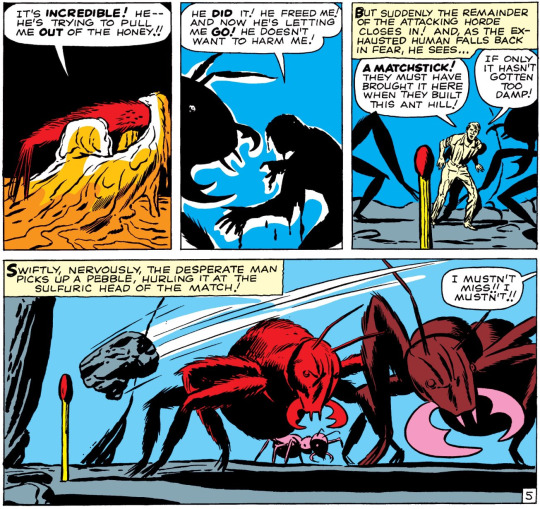
He is fortunate enough to befriend one ant willing to help him. Henry is surprised when it works to pull him free from the honey and let him go. But he also torches the ant hill so I guess fuck that ant.
When Henry finally manages to get to his enlarging serum he is so shaken by the experience that he decides that his creation is too dangerous for man kind. He then pours it down the drain. Just because it’s too dangerous for man kind doesn’t mean it’s too dangerous to dispose of properly. And now the Marvel universe is overrun by enlarged bacteria from Henry’s kitchen sink. But as long as he lives, he will never forget the ant who saved his life. Even though he totally burned down that ant’s house. Which especially sucks because I doubt ants have homeowners insurance or anything to cover fire damage.
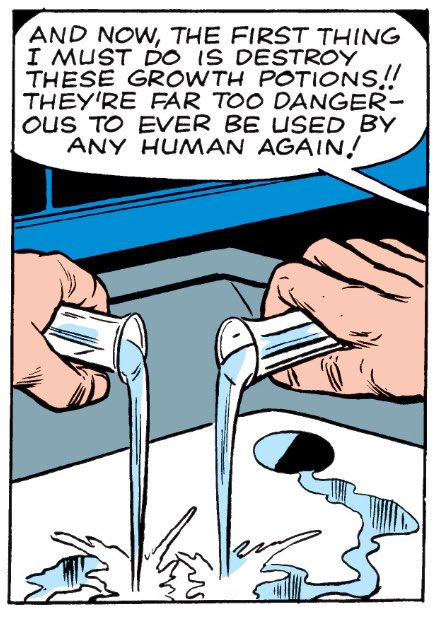
The Incredible Hulk
And the last issue I want to hit in this first installment is Incredible Hulk #1 because I think it establishes an interesting pattern with our first three protagonists of early marvel comics.
This had been advertised in the previous FF book with “Who is the Hulk?” Printed in the margins of the story, which I think is a pretty cool way to drum up interest for the book. The first run of The Incredible Hulk only lasts 6 issues. But it’s some of Jack Kirby’s best work.
This one, like Tales to Astonish, is a straight up origin story for Bruce Banner and the Hulk. If you’re familiar with Hulk through the movies, this is going to be a story that is familiar in all but one key difference.
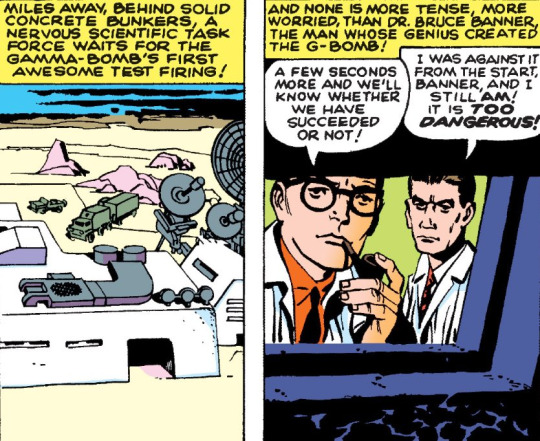
On a military base, Bruce Banner is getting ready to test his invention, the Gamma bomb. Bruce fits in along side Reed Richards and Henry Pym in the Smartest Man In The World category. He is also kind of an asshole with little regard to what others in his community have to say about his work. In fact, he has refused to share his work with his colleagues and doesn’t want them to check his work. Seems like a dick move to me.
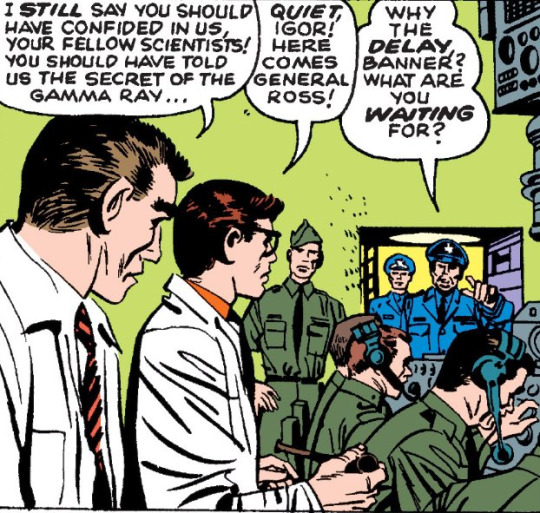
There’s actually a lot going on here in terms of toxic masculinity. We also have Thunderbolt Ross who doesn’t understand science or anyone who isn’t punching things 24/7 and all he really ever does is yell and tell his daughter to stay out of “man talk!”

Once everyone is done yelling, it’s time to test the bomb. Bruce takes one last look at it just in time to see a wayward teen, Rick Jones, driving through the test field. Bruce chases after him, because it’s perfectly reasonable to assume that he will not only catch a Jeep on foot, but he’ll also be able to do so before the bomb detonates. At least the last part wouldn’t have been a problem if he hadn’t pissed Igor off. Before running after the boy, Bruce tells him to shut down the countdown and Igor casually decides not to. And while Bruce does manage to save the kid, he gets caught in the Gamma explosion.
Hours later, Bruce wakes up at the base where he stays, being monitored for any symptoms caused by the explosion. That night, while Rick watches Bruce, he transforms into a giant Grey monster and breaks out of the base. This is where the origin deviates from what is mostly considered canon at this point. The Hulk isn’t triggered by rage or heightened emotion. Instead, he just comes out at night. Essentially, Bruce Banner is a nuclear powered werewolf.

The monster sneaks (which seems unlikely since he’s a big monster, but who knows) through the base, followed by Rick Jones. He makes his way to Bruce Banner’s cabin, where they find Igor rummaging through Bruce’s stuff. Igor shoots at The Hulk with no effect except to piss him off even more. Finally, Bruce picks up Igor and slams him down into the table where all of his research is scattered. The absolute best part of this is we learn where Bruce hides all of his research and proprietary secrets. Pages labeled “Top Secret Report on Gamma Ray Bomb” are tapped to the bottom of a beaker. Come on my guy. Buy a safe.
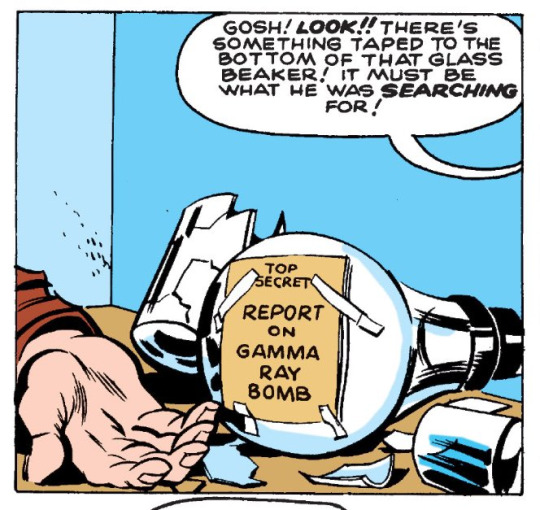
When the Hulk finds a picture of Bruce in the cabin, he is appalled to see such a weak creature until Rick reminds him that he is that weak creature. I don’t think triggering an existential crisis is the best way to defeat a radioactive werewolf, but I’ve also never had to calm one down after a rampage, so who am I to judge?
Eventually, the sun comes up and The Hulk is returned his normal Bruce Banner shape just in time for soldiers to storm his cabin, demand to know where the Hulk is and take Igor and the Top Secret Gamma report away. Betty hangs back to apologize, once again, on behalf of her father and suggest that he see a doctor. To which Bruce replies, “Baby, I am a doctor.” Okay, no he doesn’t. But we do get a fun snide commentary from Rick who has no time for Betty’s crush. Bruce tells Betty he’ll call her but also tells Rick that he’s afraid that the will never escape becoming The Hulk.

Meanwhile, Igor has been taken into custody. In his cell, he uses a transmitter embedded in his fingernail to contact the Soviet scientist known as The Gargoyle. Not a great look for the Soviets to have given him that name based on his facial deformities, but what do we really expect? The Gargoyle makes his way to the states via submarine.
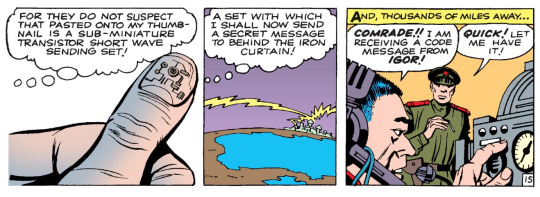
Back over in the A-Plot, Bruce and Rick are experimenting with ways to manage the Hulk for the time being. They drive the Jeep out into the desert before nightfall to get him away from the base before he changes again. After a run in with Betty that causes her to faint, the Gargoyle shows up. He shoots The Hulk and Ross with bullets filled with drugs that basically allow The Gargoyle to control their actions. They follow him onto a sub and head back to the USSR but on the rip, sun comes up and Hulk turns back into Bruce Banner.
When The Gargoyle finds him, he begins to sob, saying he wants to be a man and not a monster too. Bruce treats him with radiation which makes him look normal but also takes away his super intelligence. I guess that’s a trade off. Once he’s “cured” Gargoyle reveals that he has hella daddy issues and with the new realization that he has been used by the USSR, he basically renounces the Soviet efforts. Finally, he puts Bruce and Rick on a rocket headed for the US and blows his base up in a final act of defiance.
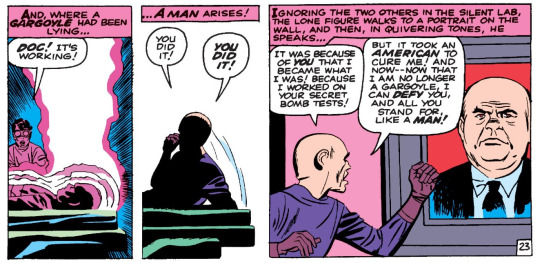
There's a lot to unpack here...
It’s actually kind of impressive to revisit comics I read as a teenager and thought very little of at the time and come away from them with a lot to chew on. There are a lot of interesting themes here with regard to how the comics interact with real world ideas and politics.
Communism, The Cold War, The Atomic Age, Vietnam
So, these comics are coming out in 61 and 62. The Cold War is in full swing, America is a few years out from entering Vietnam, and a few months prior to the release of Fantastic Four #1, the first man went to space. So much of what what we see happening on the page are consequences of that political climate just as so much of what our characters go through relate back to that central unease. Science was advancing at a more rapid pace than ever before and citizens were being warned of the constant threat that communism posed on their way of life.
There is also A LOT of anti-communist propaganda in the first decade of Marvel comics. Here, we’ve only seen it so far with the Fantastic Four needing to go to space to beat the “commies” and the Igor’s attempts to be the worlds worst double agent. We’ll see a lot more of that once we get to Journey into Mystery, because somehow the book about Norse Gods got turned into the most deliberate and most obvious anti-commie book for a while.
Science and Intelligence as it relates to Toxic Ego and Fragile Masculinity
It’s not a mistake that our three “main characters” so far are Reed Richards, Henry Pym, and Bruce Banner. All brilliant men of science who are exploring new technology in their own ways. The contrast between how Reed is treated, versus Henry and Bruce is fascinating. Reed and his contributions to science, as well as his powers have made him a celebrity. He is celebrated by his fans and his family and is all around viewed as a good guy (despite the fact that he turned three autonomous beings into cows). On the other hand, Pym and Banner are belittled. Pym is belittled by his colleagues who think his theories and his studies are outlandish and impossible. Banner is surrounded by military men who value brute strength over science. Thunderbolt Ross will constantly diminish Bruce as less of a man because he’s smart rather than strong.
The most fascinating part of this, to me, is knowing what becomes of Hank Pym in the future. Jumping ahead a little bit, his reputation in the universe and among fans will be forever tarnished by how he treats his future wife, Janet Van Dyne. In a sequence of events in a 1980s issue of the Avengers, Hank appears to strike Janet across the face. This has been, rightfully, called out as an act of domestic abuse by fans and has utterly ruined Hank’s reputation as a character. At the time, and in future incidents, the creators of that moment have discussed how they had never intended it to be viewed that way. But, even now in his first appearance, you can see the groundwork of a volatile man with a fragile ego and it’s not that much of a leap to see this man committing domestic assault.
Women as Caretakers and House Mothers
Right now, the only woman we see with any regularity is Susan storm. And we see her slotted into that mother role with the rest of the team. She is their caretaker, their costume maker, and the object of two members’ affection. This does not really improve until much later. For now, we have a woman doing woman’s work and not much else.
The only other woman we have to compare her to is Betty Ross. For the first six issues of Hulk, she is less a character and more of a background object. A full table lamp of a person, much like the earliest version of Jane Foster, who we’ll soon meet in Journey into Mystery.
‘Nuff Said!
And that wraps up the first six issues of Marvel continuity. It literally took me two months to write this post so who knows when I’ll cover the next few issues? But if you’re interested in something I update more frequently check out this twitter account I made to clean all the screencapped panels out of my camera roll: @616caps.
I’ll leave you with this incredible cutaway of the Fantastic Four’s HQ because who doesn’t love a cutaway!

1 note
·
View note